Flower murals on buildings transform urban landscapes into vibrant botanical showcases that breathe life into concrete environments. These large-scale artworks combine architectural surfaces with nature's beauty, creating stunning focal points that enhance community spaces and commercial buildings. From photorealistic blooms spanning entire walls to abstract interpretations that play with color and form, building flower murals offer endless creative possibilities. Each design approach considers the building's architecture, surrounding environment, and intended visual impact, resulting in murals that complement both urban settings and natural beauty.
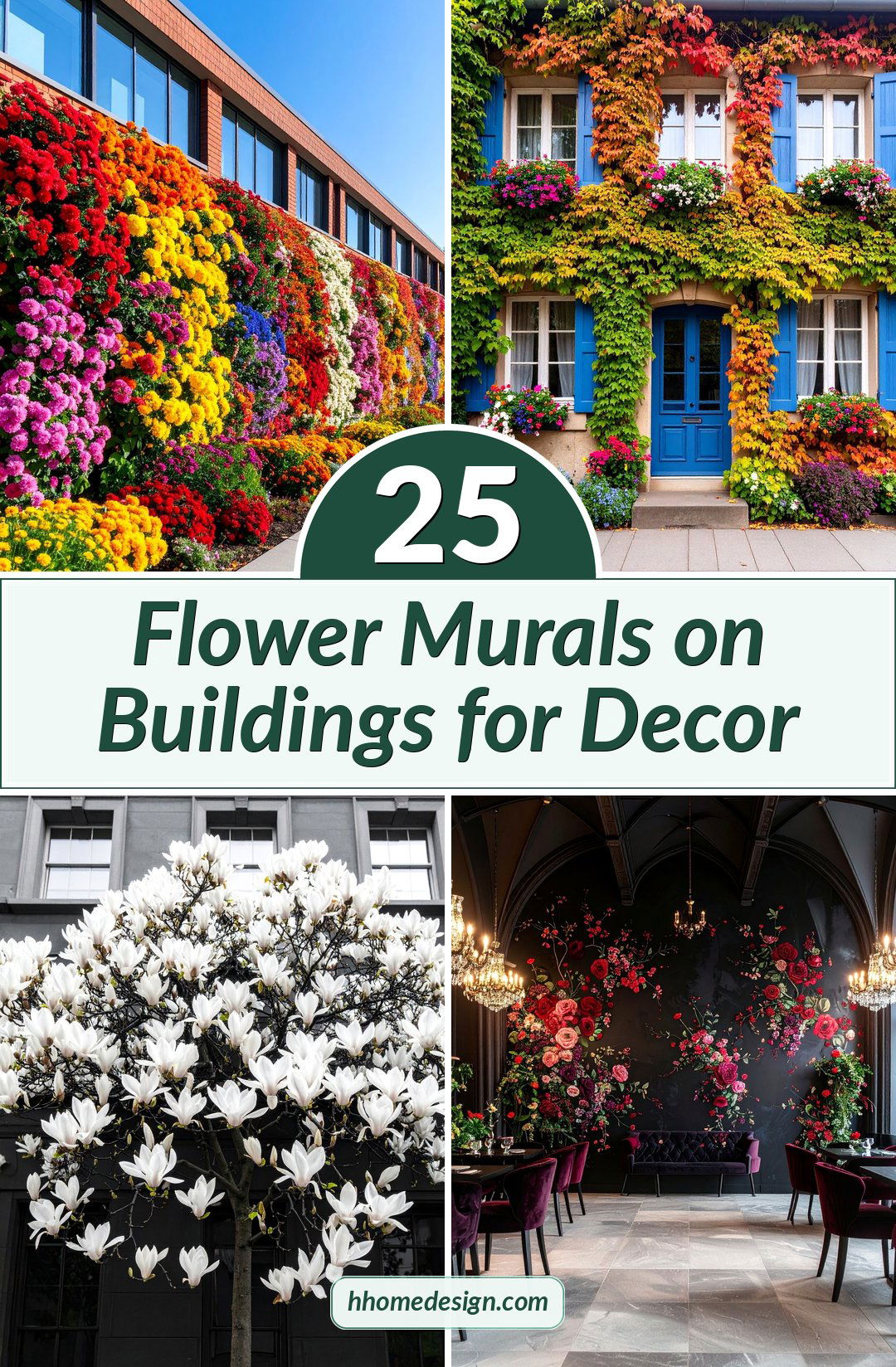
1. Monochrome Magnolia Cascade
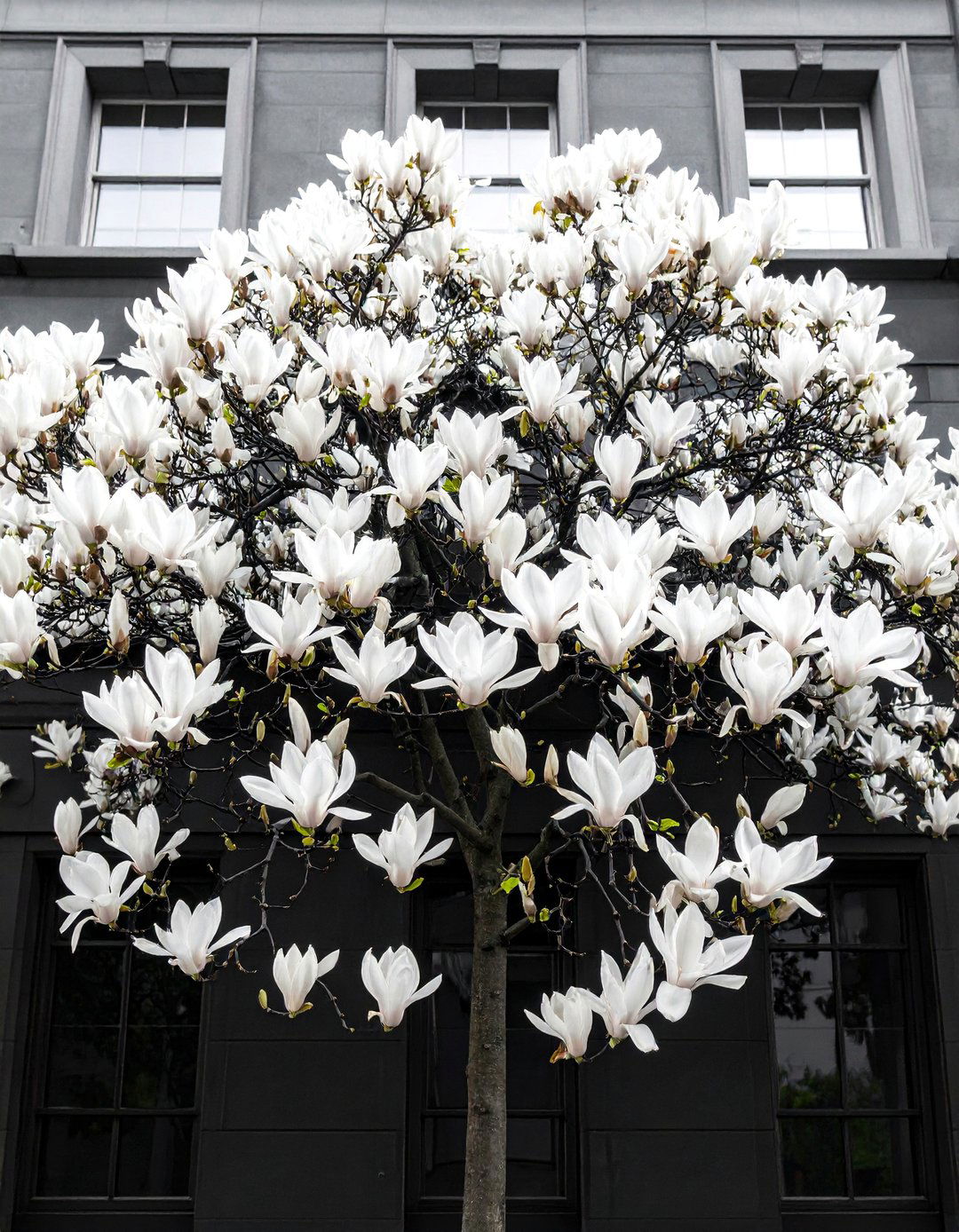
A sophisticated black-and-white magnolia design creates dramatic contrast against building facades. Large magnolia blooms flow downward from upper stories, with detailed petals and stems rendered in grayscale tones. This elegant approach emphasizes form and texture rather than color, allowing the natural architecture to complement the artwork. The monochromatic palette ensures the mural works with any building color scheme while creating timeless appeal. Detailed shading and highlights give dimension to each bloom, making the flowers appear to cascade naturally down the wall surface. This style suits corporate buildings, museums, or upscale residential complexes where understated elegance is desired.
2. Vibrant Wildflower Meadow Wrap

Colorful native wildflowers cover multiple building sides in a wraparound design that transforms the entire structure into a blooming meadow. Mixed species including poppies, daisies, and regional wildflowers create natural diversity across the surface. Bright yellows, purples, reds, and blues blend together in organic patterns that follow the building's architectural lines. This immersive approach makes viewers feel surrounded by nature, effectively disguising the urban environment. The design incorporates seasonal variations, allowing different sections to represent spring, summer, and fall blooming periods. This style works exceptionally well for community centers, schools, or buildings in residential neighborhoods.
3. Geometric Rose Garden Design

Contemporary geometric interpretation of classic roses combines traditional floral beauty with modern artistic sensibilities. Stylized rose shapes use clean lines and bold color blocks rather than realistic rendering. Angular petals and stems create striking patterns that complement modern architecture while maintaining recognizable rose forms. The design employs a limited color palette of deep reds, soft pinks, and sage greens for sophisticated visual impact. Geometric borders and repeated patterns create rhythm across the building surface. This approach appeals to contemporary spaces, office buildings, or modern residential developments where traditional florals might seem out of place.
4. 3D Peony Bloom Illusion
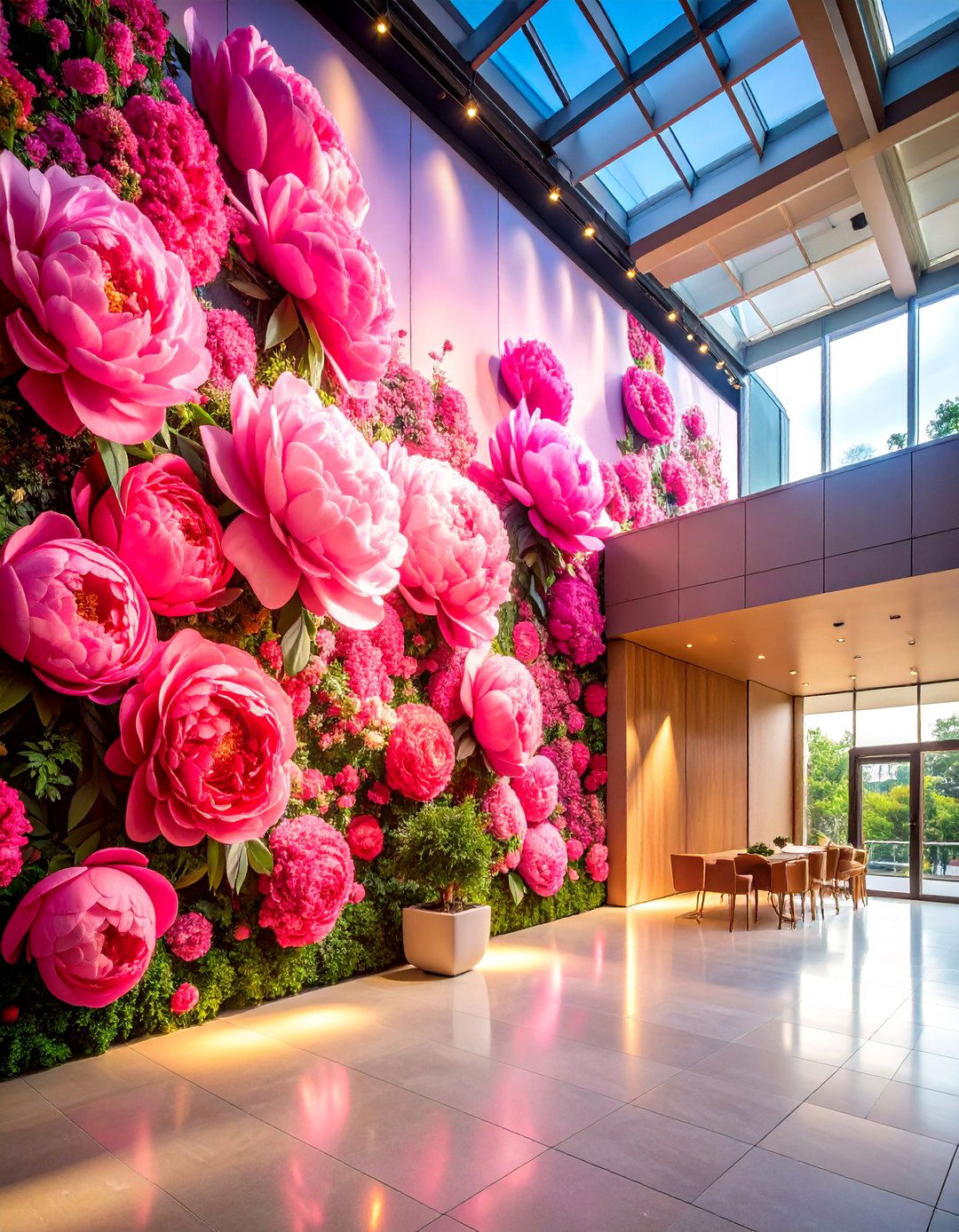
Massive peony flowers appear to burst forth from the building surface using advanced shading and perspective techniques. Each bloom showcases incredible depth and dimension, creating the illusion that oversized flowers are growing directly from the wall. Realistic color gradients and detailed petal textures enhance the three-dimensional effect. Strategic placement of highlights and shadows makes certain petals seem to extend beyond the building plane. The overwhelming scale of these blooms creates awe-inspiring focal points visible from great distances. This dramatic approach suits entertainment venues, shopping centers, or any building where maximum visual impact is desired. Multiple peonies can span several stories for even greater effect.
5. Watercolor Cherry Blossom Wall

Soft, flowing watercolor techniques create delicate cherry blossom murals that seem painted with giant brushes directly onto building surfaces. Gentle pink and white petals blend seamlessly with pale blue backgrounds, mimicking the ethereal quality of spring cherry trees. The watercolor effect includes natural drips, color bleeding, and translucent layers that give the mural an organic, artistic quality. Branches extend gracefully across the wall surface, creating movement and natural flow. This gentle approach provides calming visual relief in busy urban environments. The technique works beautifully on buildings with smooth surfaces where the watercolor effects can be fully appreciated by passersby.
6. Abstract Orchid Elegance

Sophisticated orchid designs use abstract interpretation to emphasize the exotic flower's unique forms and colors. Bold purples, whites, and yellows create striking compositions that capture orchid essence without literal representation. Flowing lines suggest stem curves and petal shapes while allowing artistic freedom in color application and pattern creation. The abstract approach enables larger-scale compositions that might be impossible with realistic rendering. Modern color gradients and unexpected color combinations create contemporary appeal while honoring the orchid's natural elegance. This style suits galleries, cultural centers, or upscale commercial buildings where artistic sophistication is appreciated. The design can incorporate metallic accents for added luxury.
7. Sunset Hibiscus Paradise
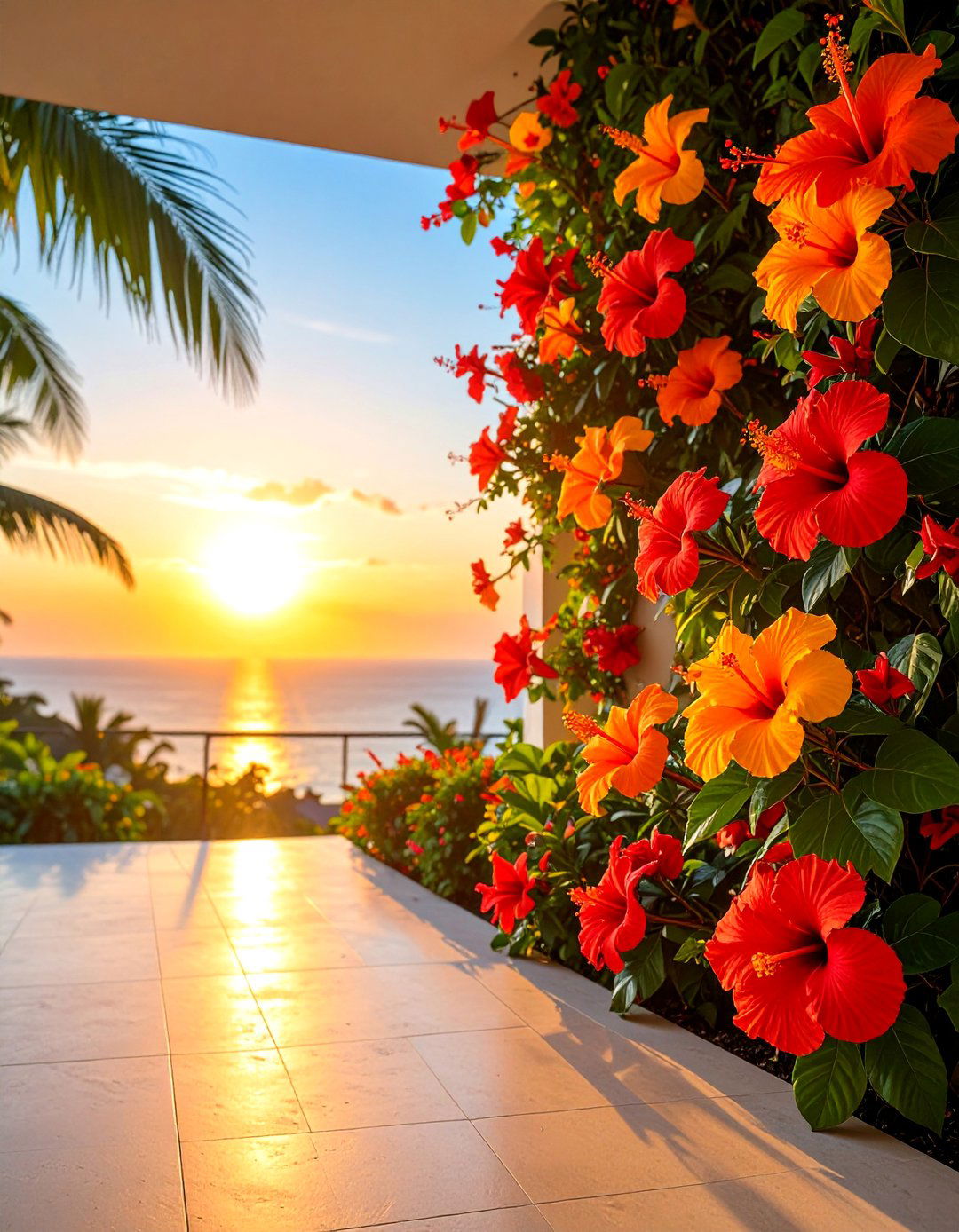
Tropical hibiscus flowers bloom across building surfaces in warm sunset colors that create paradise-like atmospheres in urban settings. Large hibiscus blooms in oranges, reds, and yellows blend with deep purple and pink backgrounds reminiscent of tropical sunsets. Lush green foliage complements the warm flower tones while adding depth and natural texture. The design incorporates gradient backgrounds that transition from warm sunset hues to deeper evening colors, creating dramatic lighting effects. Multiple hibiscus varieties showcase different bloom sizes and petal configurations. This vibrant approach transforms commercial buildings, hotels, or restaurants into tropical destinations that transport viewers to paradise regardless of geographic location.
8. Botanical Illustration Garden

Scientific botanical illustration style creates educational and beautiful flower murals that celebrate both art and nature. Detailed renderings showcase flower anatomy, including visible stamens, pistils, and leaf structures with accompanying subtle labels. The precise illustration technique uses natural colors and careful attention to botanical accuracy. Multiple flower species can be arranged in garden-like compositions across large wall surfaces. This approach combines beauty with educational value, making it ideal for schools, libraries, museums, or healthcare facilities. The detailed illustrations invite close examination while creating stunning overall compositions. Backgrounds remain neutral to emphasize the scientific illustration aesthetic while ensuring excellent visibility of botanical details.
9. Climbing Vine Floral Display
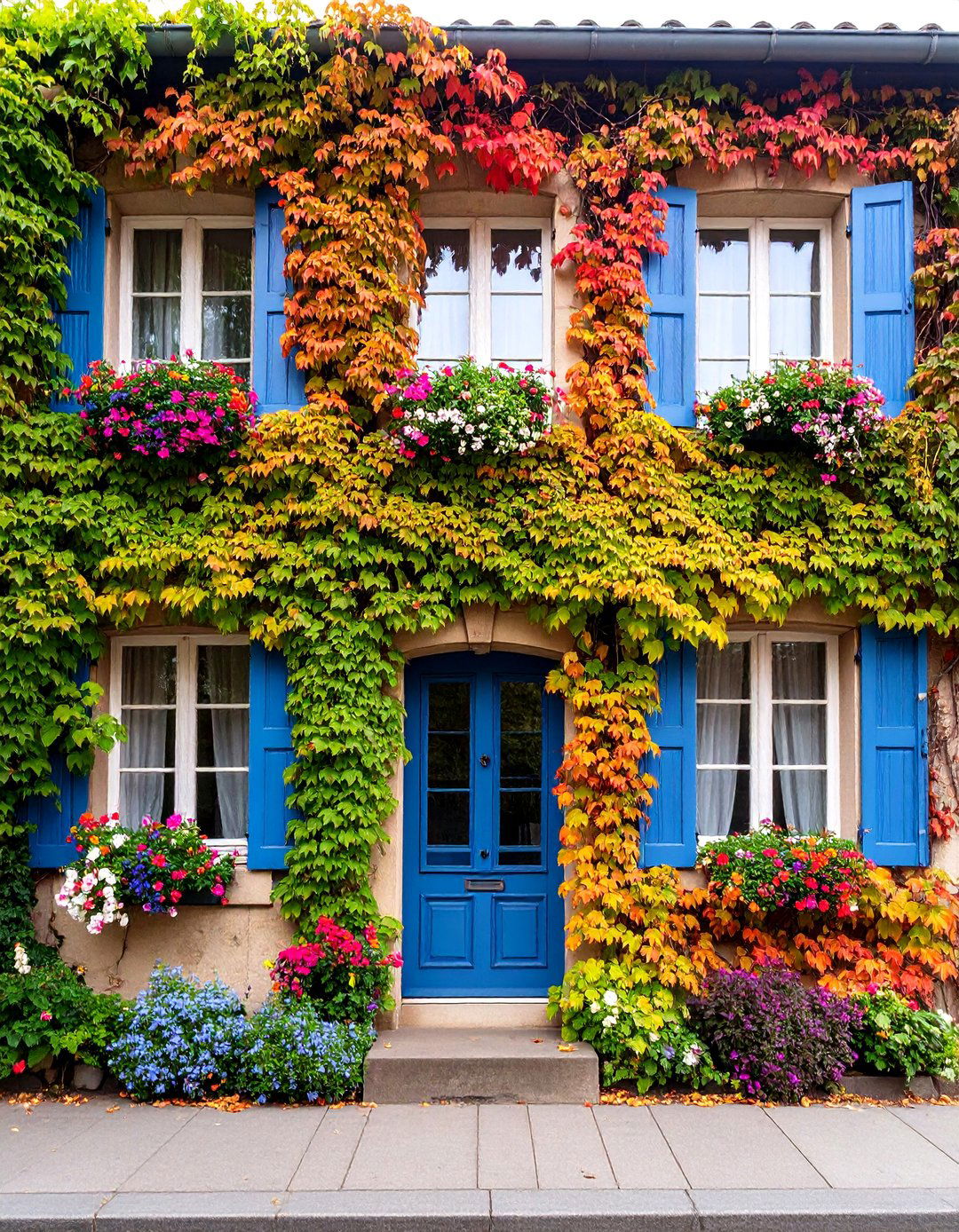
Realistic climbing vines with abundant flowers create natural growth patterns that follow building architecture. Morning glories, jasmine, or climbing roses appear to grow up building sides, around windows, and across architectural features. The design incorporates actual building elements like drain pipes, window frames, and architectural details as natural supports for the painted vines. Seasonal variations can show different blooming periods throughout the year. This organic approach softens harsh architectural lines while creating the illusion that nature is reclaiming urban structures. The technique works especially well on older buildings where the vine integration can appear completely natural. Strategic placement makes the building appear garden-integrated.
10. Minimalist Lotus Serenity
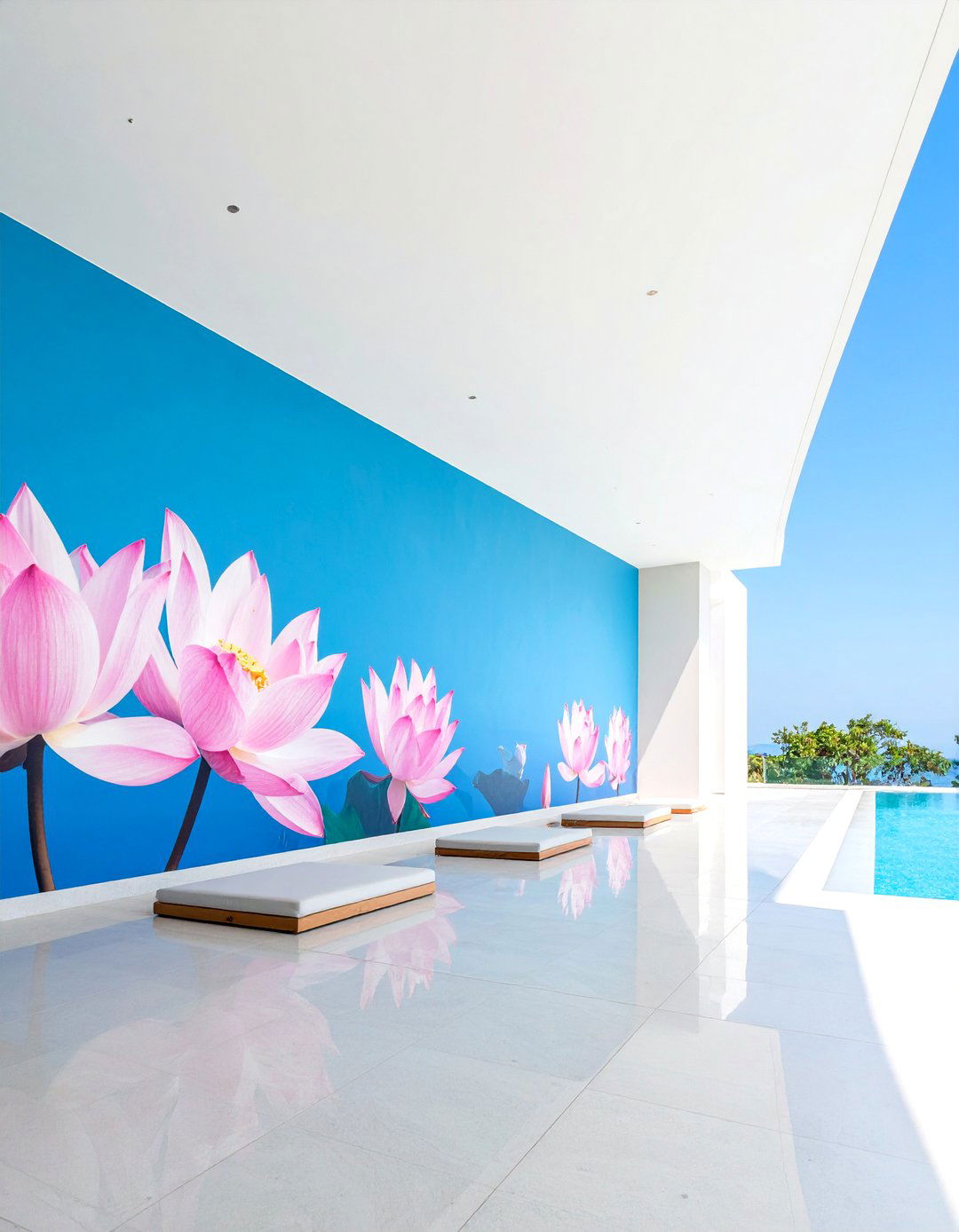
Clean, simplified lotus designs emphasize tranquility and spiritual symbolism through minimal color palettes and essential forms. Large lotus blooms use white, pale pink, and soft yellow against calm blue or grey backgrounds. The minimalist approach focuses on essential lotus shapes without unnecessary detail, creating meditative visual experiences. Strategic negative space balances the composition and enhances the peaceful atmosphere. Single massive lotus blooms can span multiple stories, while smaller groupings create rhythmic patterns across building surfaces. This serene approach suits meditation centers, healthcare facilities, wellness centers, or any building where calm, peaceful energy is desired. The simple forms work well with both traditional and modern architecture.
11. Graffiti-Style Sunflower Art

Bold street art techniques transform sunflowers into vibrant urban expressions that celebrate both nature and street culture. Bright yellows, oranges, and browns use spray paint effects and bold outlines characteristic of graffiti artistry. Dynamic compositions show sunflowers from various angles with energetic backgrounds and urban-inspired color combinations. The style incorporates graffiti lettering elements and abstract patterns that complement the floral subjects. Multiple artist signatures and collaborative elements can make the mural a community art project. This energetic approach works well in creative districts, youth centers, or areas where contemporary urban art is appreciated. The bold style ensures visibility from significant distances while celebrating both botanical beauty and street art culture.
12. Pastel Poppy Field Mural

Gentle pastel poppies create dreamy, romantic atmospheres using soft pinks, lavenders, pale yellows, and cream colors. Delicate color transitions and subtle shading techniques give the flowers ethereal qualities that seem to glow against neutral backgrounds. The soft color palette creates calming effects while maintaining visual interest through varied flower sizes and gentle movement patterns. Overlapping blooms create depth without harsh contrasts, maintaining the gentle, romantic mood throughout the composition. This approach works beautifully for boutique hotels, cafes, wellness centers, or residential buildings where peaceful, uplifting energy is desired. The pastel approach ensures the mural complements rather than overwhelms surrounding architecture and landscapes.
13. Dark Floral Gothic Theme

Dramatic dark backgrounds showcase richly colored flowers in mysterious, sophisticated compositions that blend beauty with dramatic intensity. Deep purples, burgundy reds, and black backgrounds create striking contrasts with luminous flower colors. Gothic-inspired compositions use dramatic lighting effects and rich textures that give the murals almost theatrical qualities. Dark roses, dramatic lilies, and other bold flowers appear to emerge from shadowy backgrounds with supernatural beauty. This moody approach suits entertainment venues, upscale restaurants, art galleries, or buildings where dramatic visual impact is desired. Metallic accents can enhance the luxurious feeling while ensuring the dark palette doesn't overwhelm the space.
14. Tropical Bird of Paradise Design
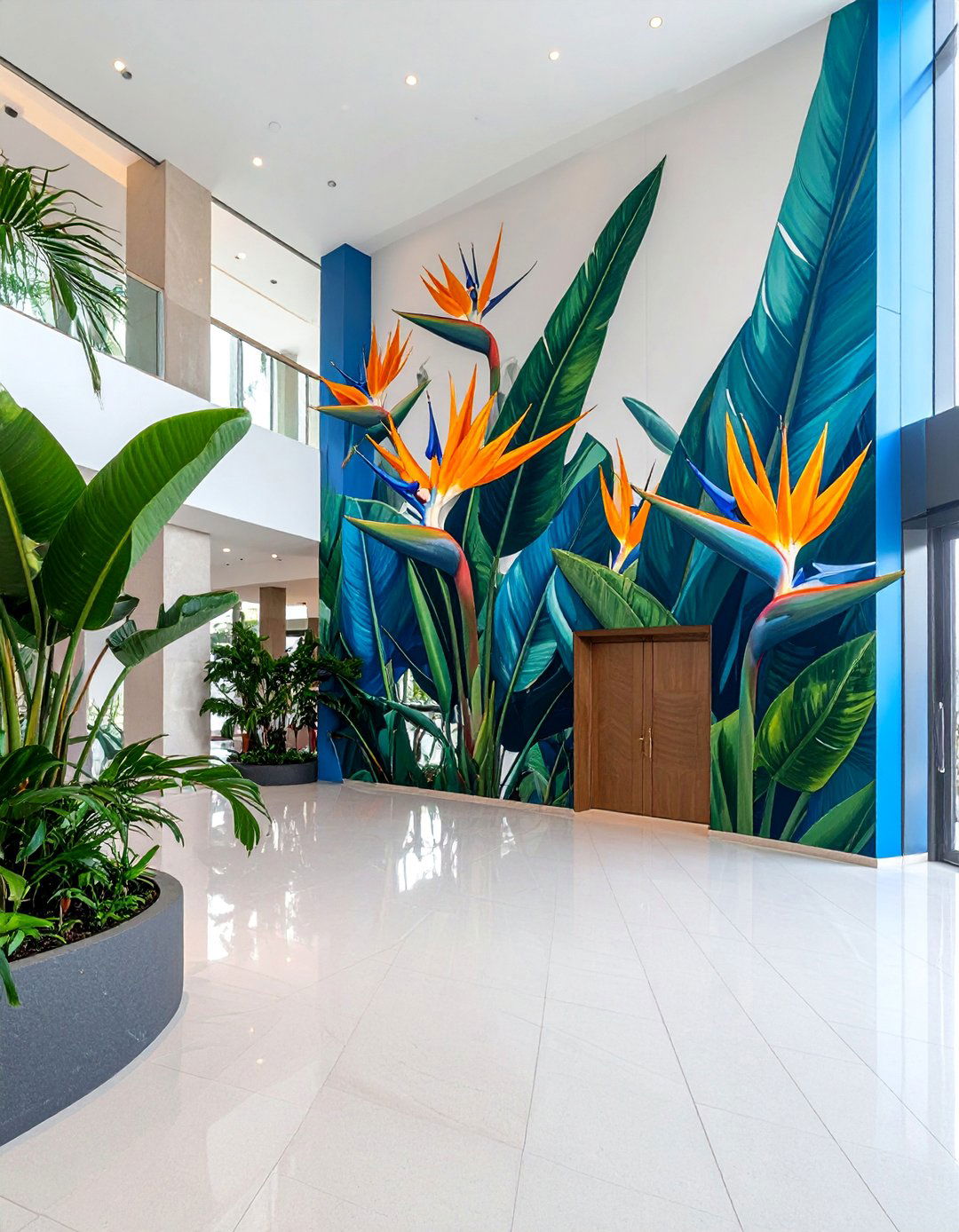
Exotic bird of paradise flowers create stunning tropical displays with their distinctive orange and blue coloring and dramatic angular forms. The unique flower shapes lend themselves perfectly to large-scale mural work, with pointed petals and vibrant colors creating natural focal points. Lush tropical foliage in various shades of green provides rich backgrounds and context for the exotic blooms. The design can incorporate multiple bird of paradise plants at different growth stages and blooming phases. This bold tropical approach transforms any building into an exotic destination, working especially well for resorts, restaurants, shopping centers, or entertainment venues where vibrant energy and tropical appeal are desired.
15. Vintage Victorian Rose Pattern
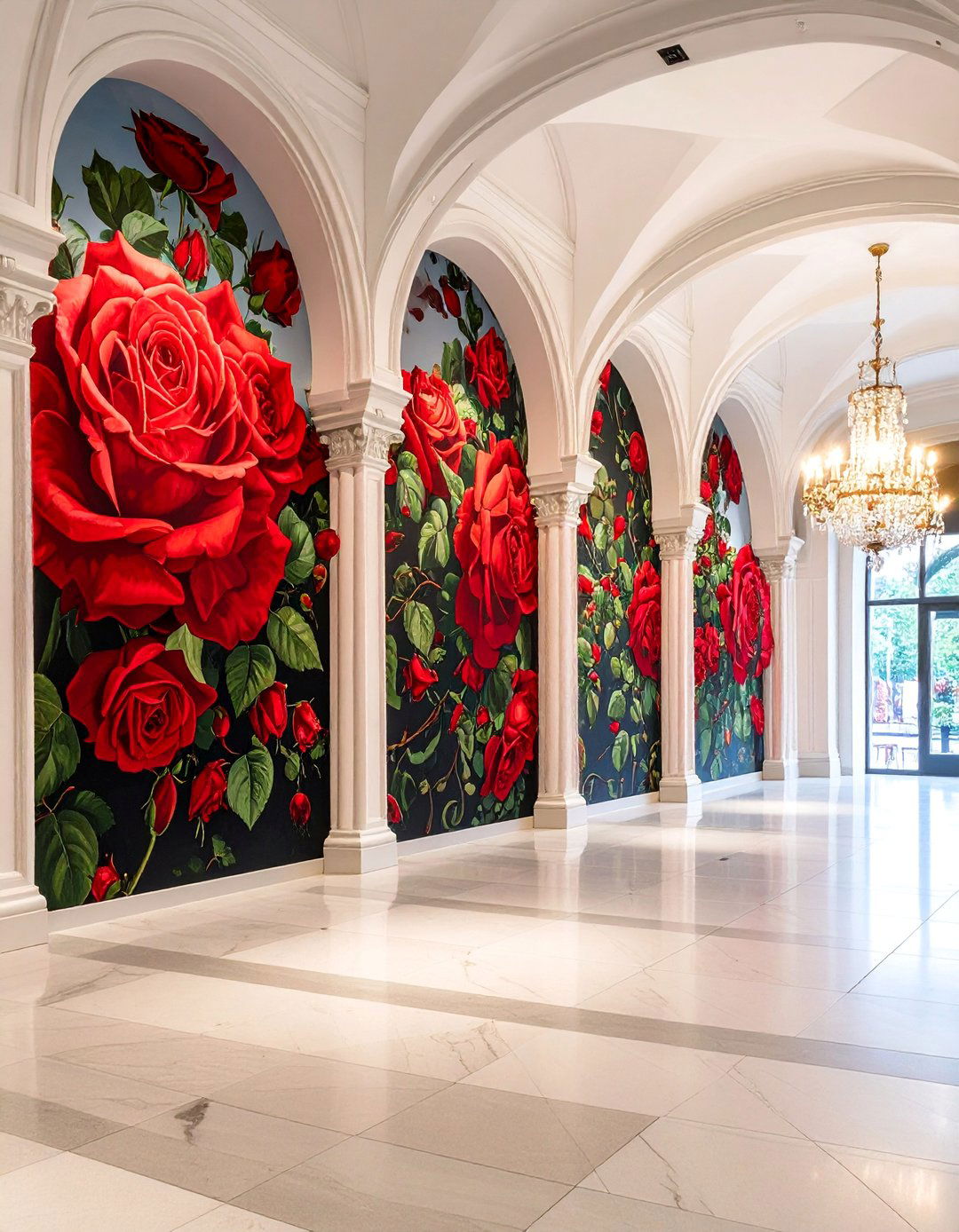
Ornate Victorian-inspired rose patterns use traditional design elements and rich color palettes reminiscent of historical wallpaper and textile designs. Detailed roses in deep reds, soft pinks, and cream colors combine with elaborate scrollwork and decorative elements. The formal pattern approach creates elegant, timeless compositions that complement classical architecture while working well with contemporary buildings seeking traditional elegance. Gold accents and detailed linework enhance the luxurious vintage appeal. This sophisticated approach suits boutique hotels, upscale retail spaces, cultural institutions, or residential buildings where classical elegance and historical charm are appreciated. The formal pattern structure ensures visual coherence across large architectural surfaces.
16. Contemporary Dahlia Explosion

Modern artistic interpretation of dahlia blooms uses bold colors and dynamic compositions that capture the flower's natural geometric patterns and abundant petals. Oversized dahlias in unexpected color combinations create striking contemporary art pieces that work as architectural focal points. The design emphasizes the dahlia's natural symmetry and layered petal structures through artistic interpretation rather than realistic rendering. Backgrounds use complementary colors and modern artistic techniques that enhance rather than distract from the floral subjects. This approach suits modern office buildings, contemporary residential developments, or cultural centers where bold artistic statements are appreciated. Multiple dahlia varieties can showcase different forms and color combinations.
17. Native Wildflower Heritage
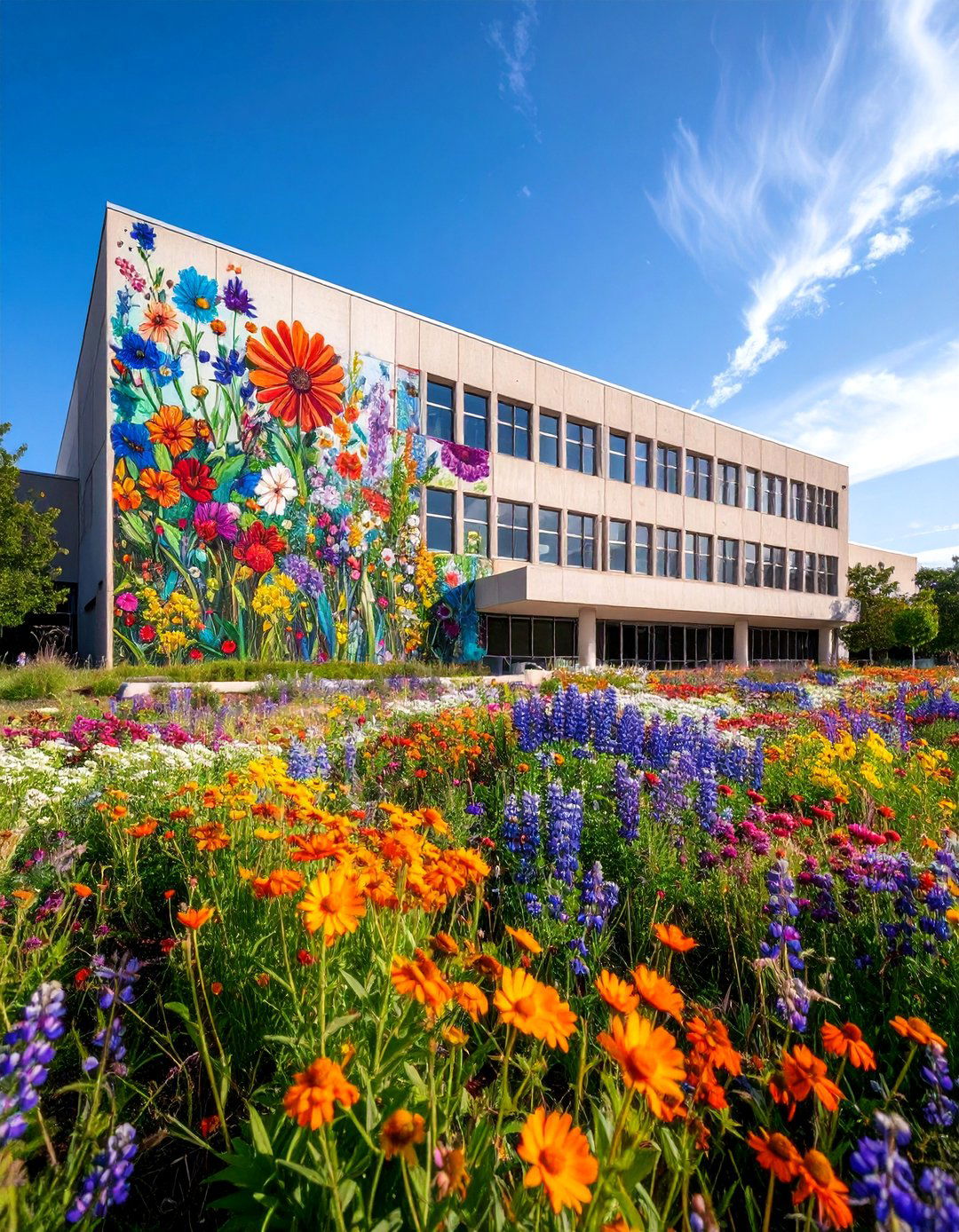
Regional native wildflowers celebrate local botanical heritage while creating meaningful connections between buildings and their natural environments. Research-based selection includes flowers indigenous to the specific geographic area, creating educational and environmentally relevant artistic displays. Local ecological relationships and seasonal blooming patterns inform the design composition and color choices. The approach can include subtle educational elements that help viewers identify and appreciate local flora. This meaningful approach works well for municipal buildings, schools, environmental centers, or community facilities where local pride and environmental awareness are important values. The design celebrates regional identity while creating beautiful architectural enhancement.
18. Impressionist Lily Pond
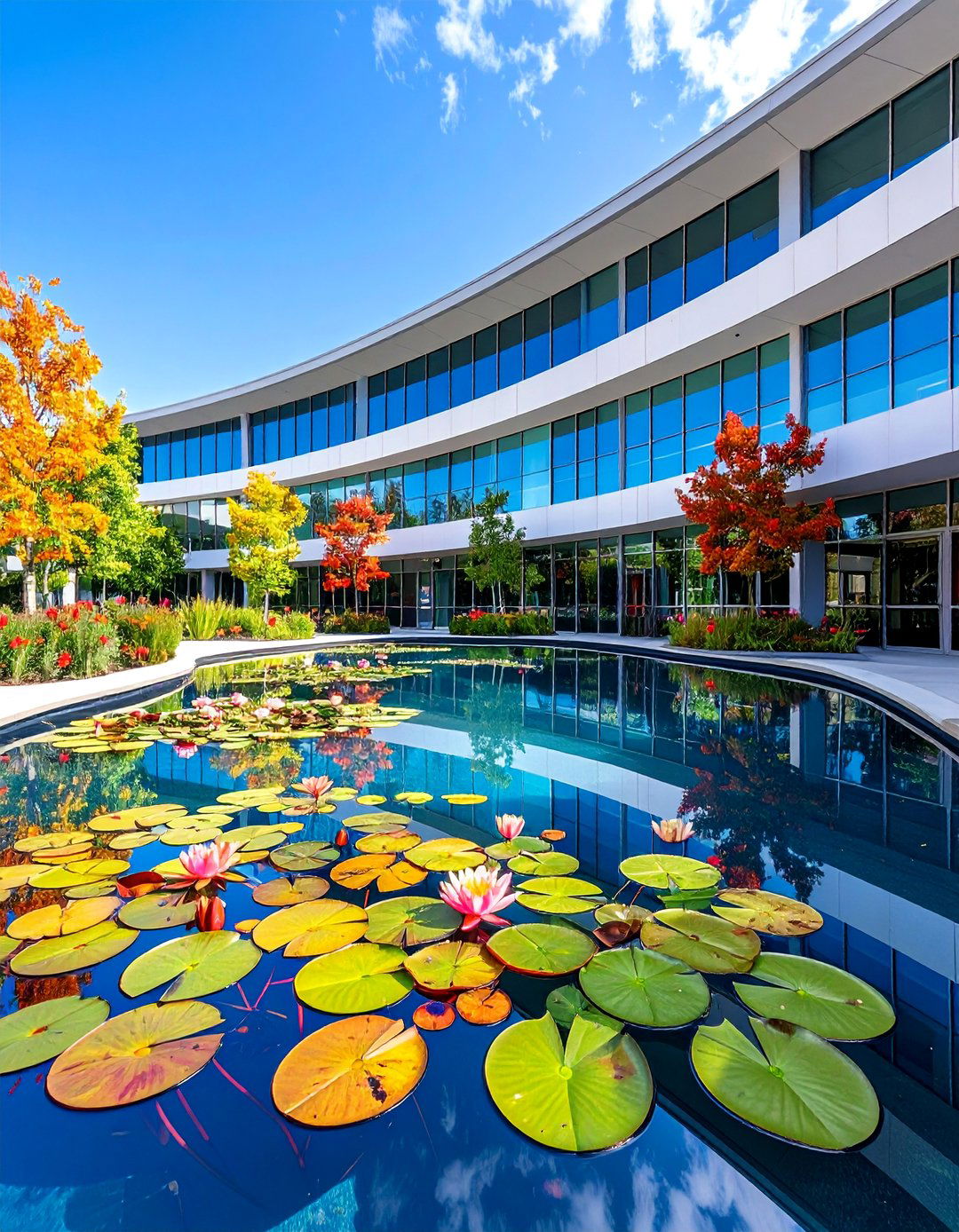
Artistic interpretation inspired by impressionist painting techniques creates lily pond murals with soft colors and gentle brush stroke effects. Water lilies float on painted pond surfaces with reflective qualities and dappled light effects reminiscent of Monet's famous lily paintings. Gentle color blending and soft edges create peaceful, meditative atmospheres perfect for healthcare facilities, meditation centers, or wellness-focused buildings. The technique includes water reflection effects and gentle color transitions that create depth and movement within the composition. Subtle background elements suggest peaceful pond environments without overwhelming the lily subjects. This artistic approach combines fine art traditions with architectural enhancement for sophisticated visual appeal.
19. Modern Tulip Geometric

Clean geometric interpretation of tulip forms uses contemporary design principles while celebrating the flower's naturally simple and elegant shape. Bold color blocks and clean lines create striking modern compositions that work well with contemporary architecture. The design approach emphasizes tulip cup shapes and stem lines through geometric simplification rather than realistic detail. Multiple tulip varieties in coordinated color schemes create rhythmic patterns across building surfaces. Modern color palettes can include unexpected combinations that maintain tulip recognition while adding contemporary artistic appeal. This approach suits office buildings, modern residential developments, or commercial spaces where clean, contemporary design is preferred while maintaining natural beauty references.
20. Seasonal Flower Transition
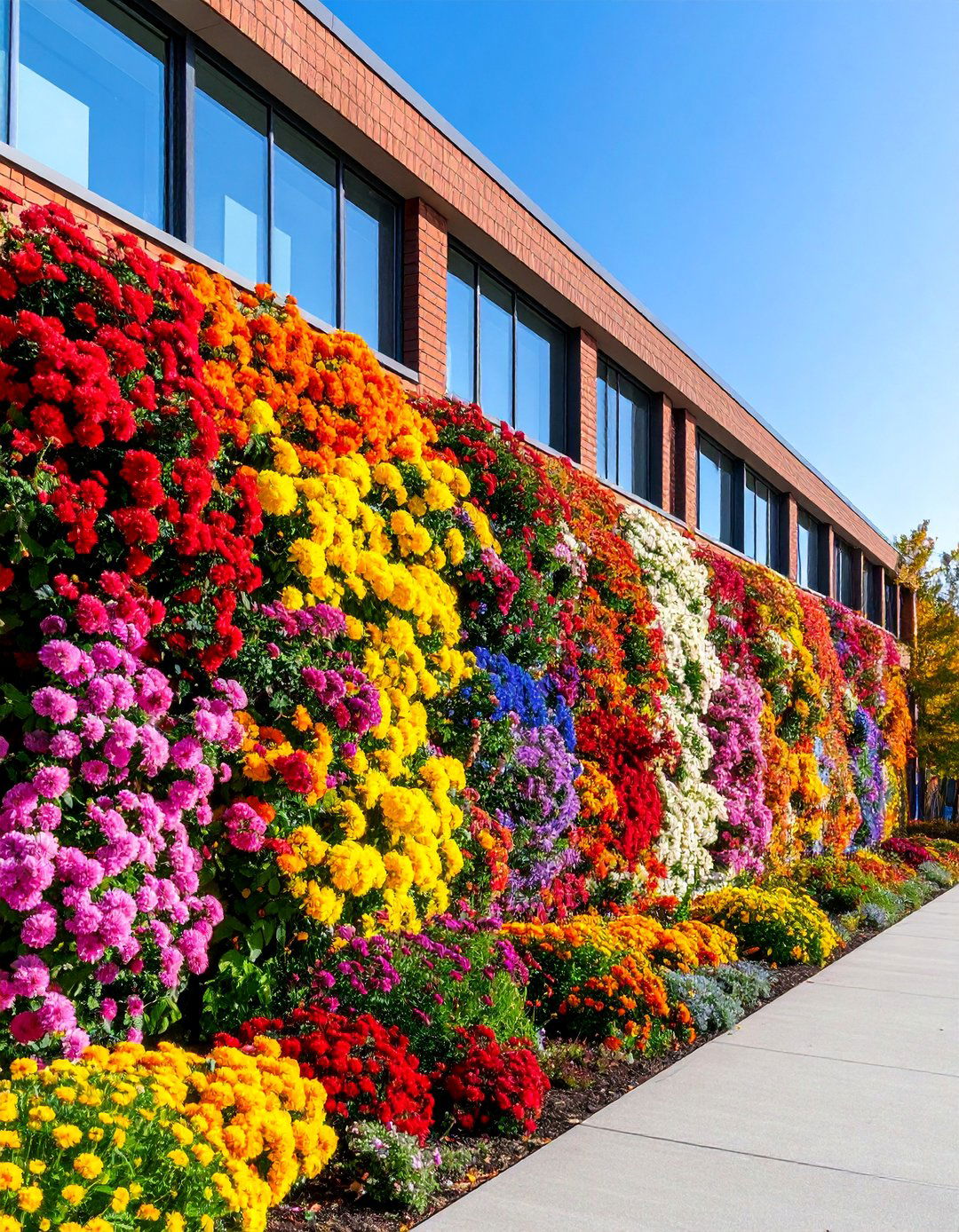
Dynamic mural design showcases different flowers representing seasonal changes, creating ever-changing visual experiences that connect viewers with natural cycles. Spring cherry blossoms transition to summer roses, autumn chrysanthemums, and winter evergreen arrangements across different building sections. The design can use color transitions that blend seasonal palettes naturally from one section to another. This approach creates year-round visual interest while celebrating natural cycles and seasonal beauty. The design works especially well for buildings visible from multiple angles where different seasonal sections can be appreciated separately. Educational elements can highlight seasonal changes and natural cycles, making this approach ideal for schools or community centers.
21. Mixed Media Botanical Collage
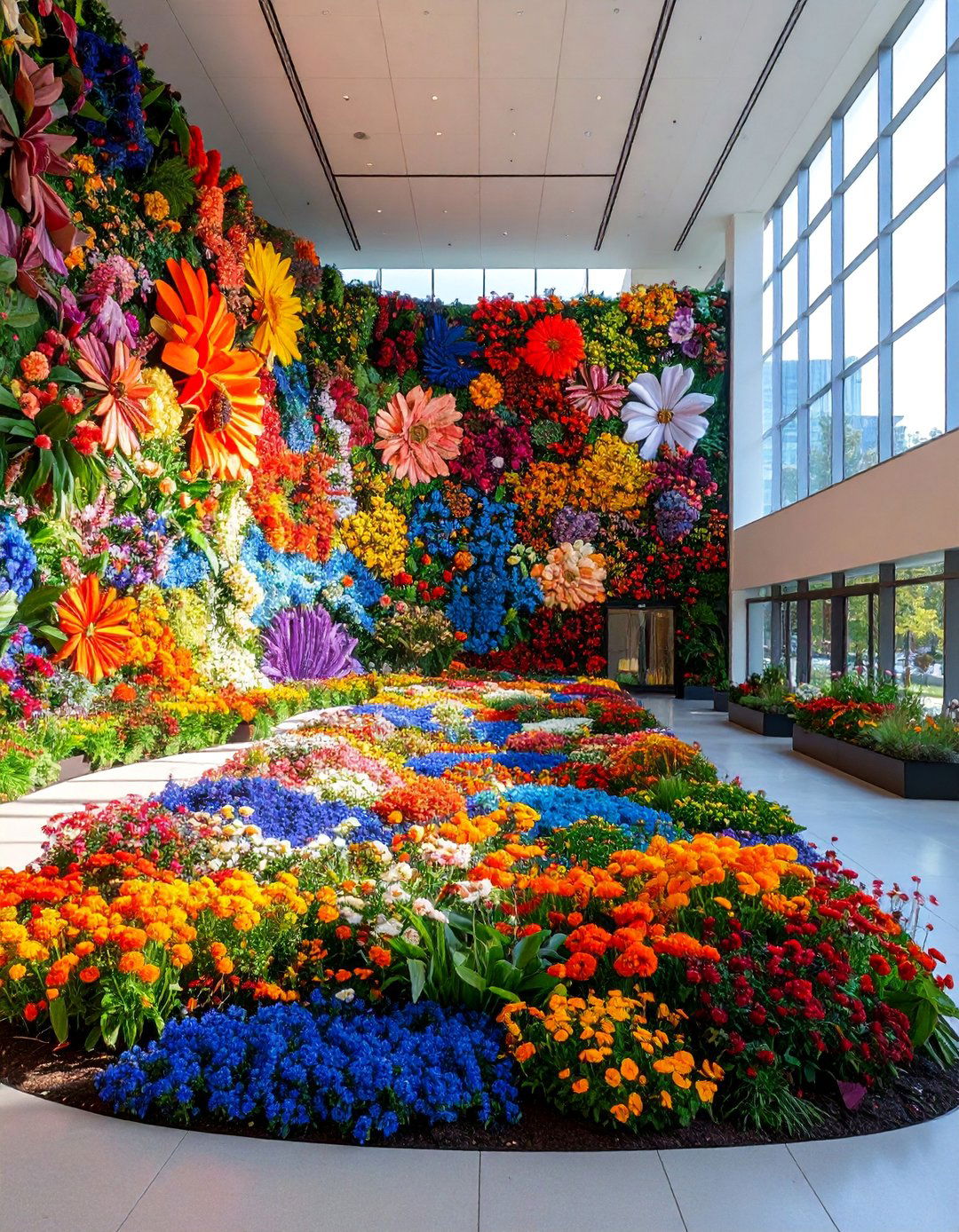
Contemporary artistic approach combines various artistic techniques and media representations within single mural compositions, creating complex botanical collages that celebrate artistic diversity. Realistic flower painting combines with abstract elements, geometric patterns, and stylized interpretations within unified compositions. Different artistic techniques can represent different flower types or sections, creating visual variety while maintaining overall coherence. This eclectic approach showcases artistic versatility while creating unique, one-of-a-kind building artworks. The design can incorporate community artist contributions or various artistic styles that reflect cultural diversity. This approach works well for arts districts, cultural centers, or buildings where artistic experimentation and creativity are celebrated values.
22. Rainbow Cosmos Galaxy

Whimsical cosmos flowers bloom in rainbow colors across building surfaces, creating joyful, uplifting displays that celebrate color and natural beauty simultaneously. Traditional cosmos flower forms use unexpected rainbow color combinations that create magical, fantastical garden environments. Gradient backgrounds can suggest cosmic or celestial themes that complement the rainbow flower colors. The playful approach creates family-friendly displays that appeal to children while maintaining sophisticated artistic execution. Overlapping cosmos blooms in various sizes create depth and movement throughout the composition. This joyful approach works well for children's facilities, community centers, or any building where uplifting, positive energy is desired. The rainbow colors ensure year-round visual appeal and universal positive response.
23. Industrial Ivy Integration
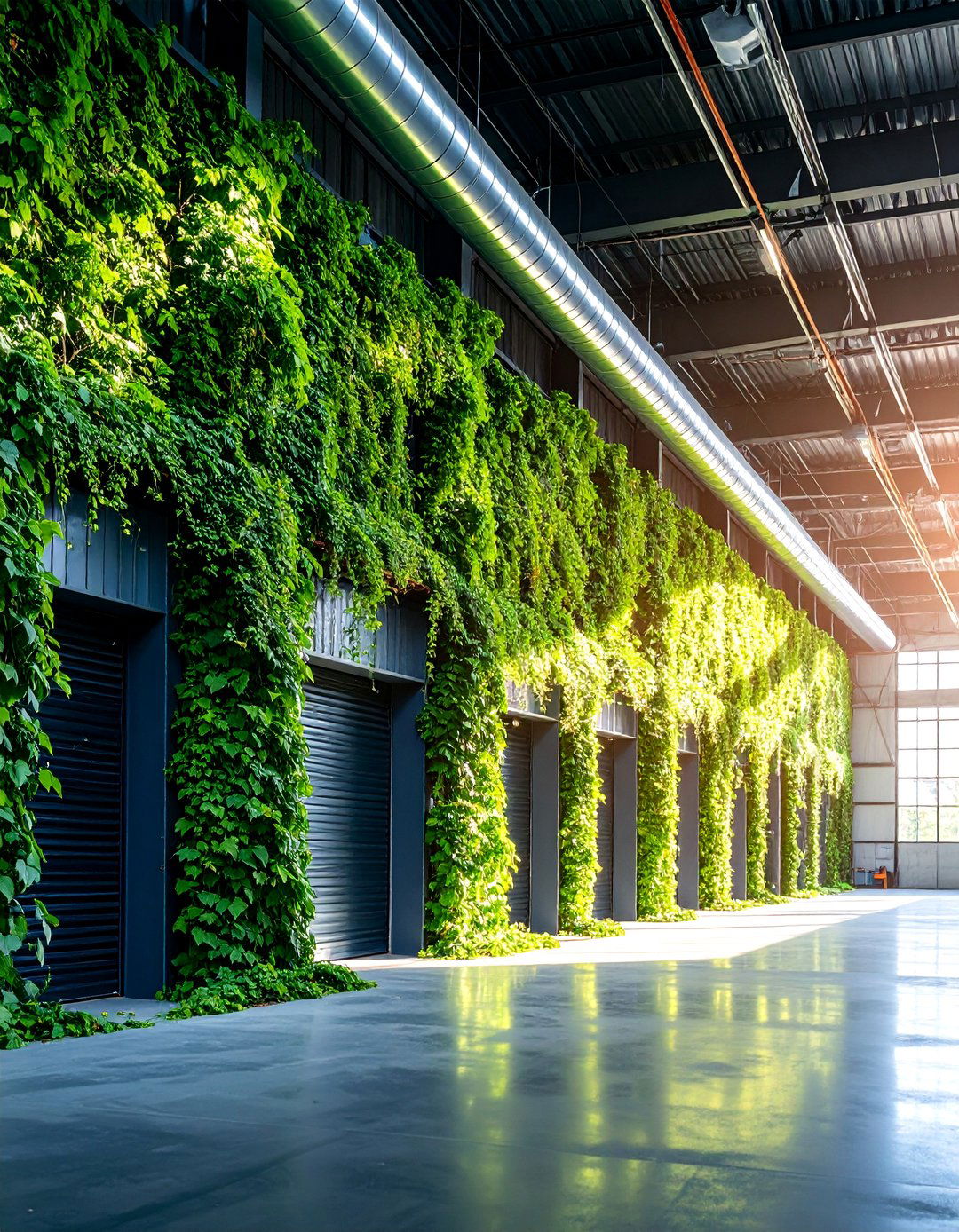
Artistic ivy and flowering vine designs integrate directly with building infrastructure, making industrial elements like pipes, vents, and architectural features appear naturally overgrown. The design celebrates the contrast between industrial architecture and natural growth while creating unique artistic statements. Realistic ivy leaves and small flowers follow building lines and architectural details, softening harsh industrial elements through natural integration. This approach can make utilitarian buildings more visually appealing while maintaining their functional character. Strategic integration makes building infrastructure appear intentionally designed for natural integration. The technique works especially well for warehouses, industrial facilities, or urban buildings where softening architectural harshness is desired.
24. Fairy Tale Flower Forest
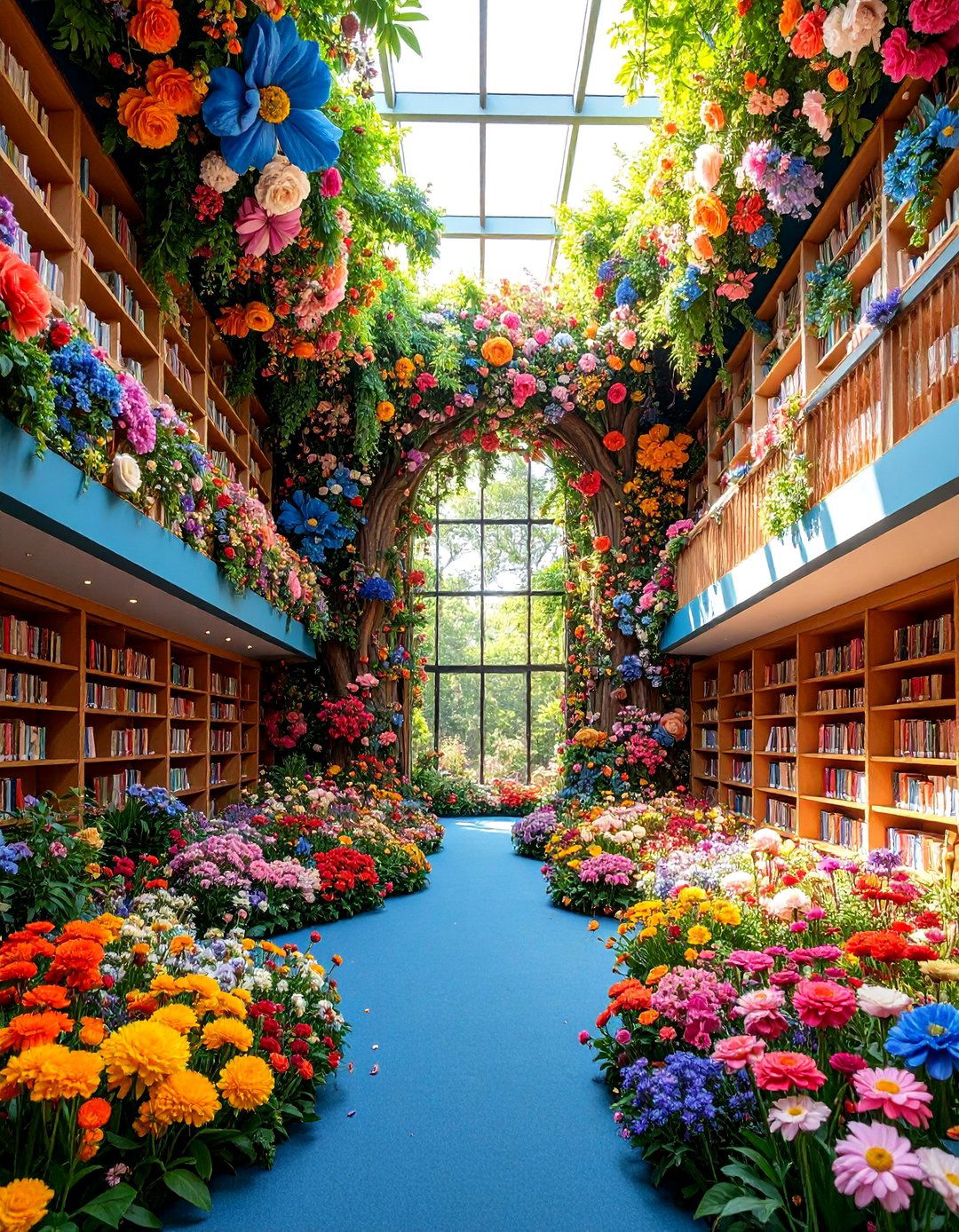
Enchanting flower forest murals create magical atmospheres using oversized flowers, whimsical color combinations, and fantastical compositions that suggest fairy tale environments. Oversized blooms tower above viewers while smaller flowers create detailed foregrounds that invite exploration. Fantasy color palettes use unexpected combinations that maintain natural beauty while adding magical qualities. The design can incorporate subtle fairy tale elements or hidden details that reward close examination. This imaginative approach creates memorable experiences that transport viewers to magical worlds. The technique works wonderfully for children's hospitals, libraries, entertainment venues, or any facility where imagination and wonder are important values. Lighting effects can enhance the magical atmosphere.
25. Urban Jungle Floral Canopy
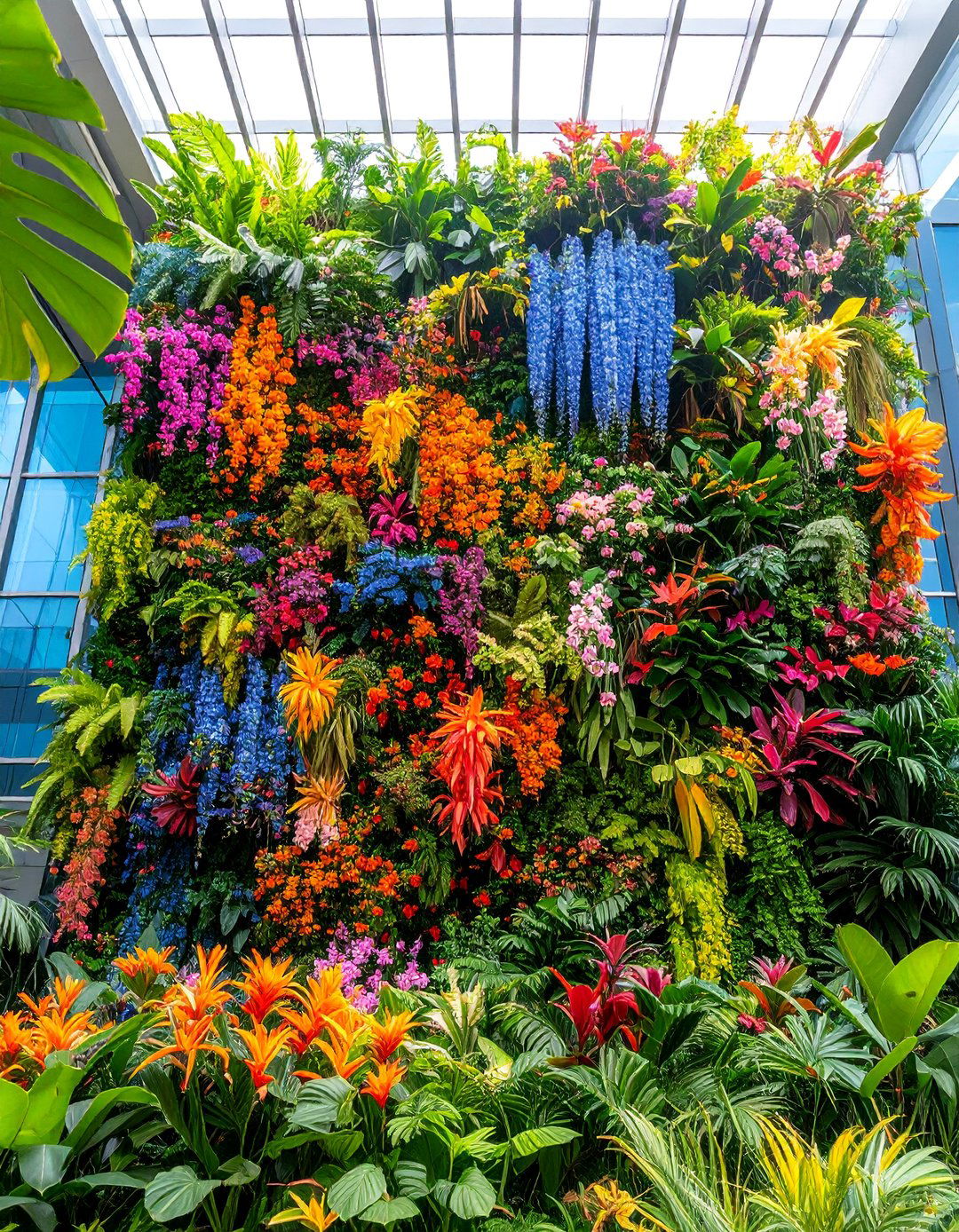
Comprehensive building coverage creates complete urban jungle environments where flowers and foliage cover entire structures from foundation to roofline. Mixed tropical and temperate flowers create diverse botanical environments that transform buildings into natural habitats. The design incorporates various plant heights and types to create realistic jungle density and diversity. Strategic color coordination ensures visual coherence while maintaining natural variety and botanical realism. This immersive approach completely transforms building character, making urban structures disappear within painted natural environments. The technique works especially well for large buildings where complete transformation creates maximum impact. Multiple building sides can represent different jungle environments or seasonal variations.
Conclusion:
Flower murals on buildings represent powerful intersections between urban development and natural beauty, transforming architectural surfaces into living canvases that celebrate botanical diversity. These 25 design themes showcase the endless creative possibilities available when artists combine floral subjects with architectural spaces, from minimalist lotus serenity to explosive rainbow cosmos galaxies. Each approach offers unique benefits for different building types, community needs, and aesthetic preferences while contributing to urban beautification and environmental connection. The future of building flower murals promises continued innovation as artists develop new techniques and communities increasingly value public art that bridges nature and urban life.


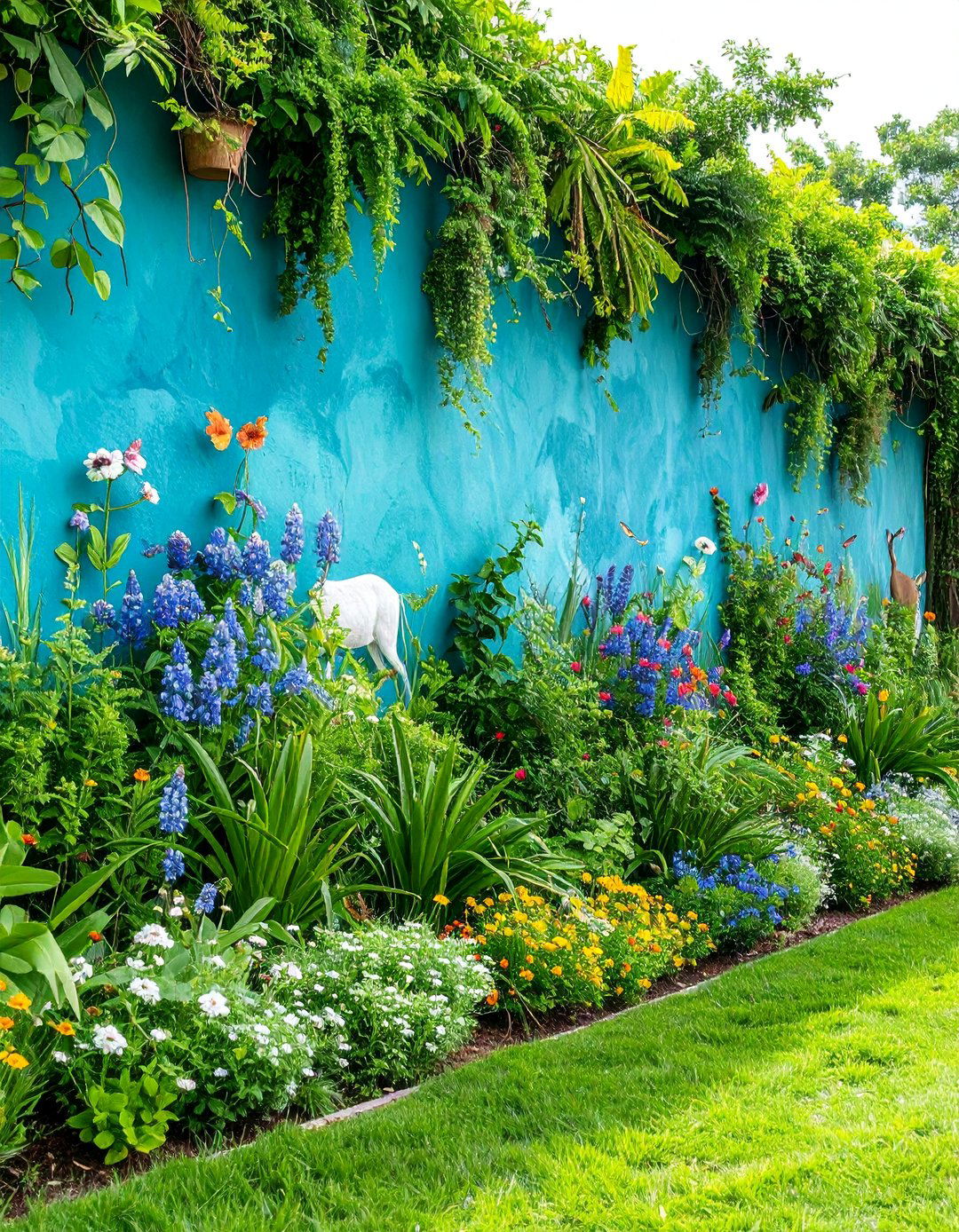
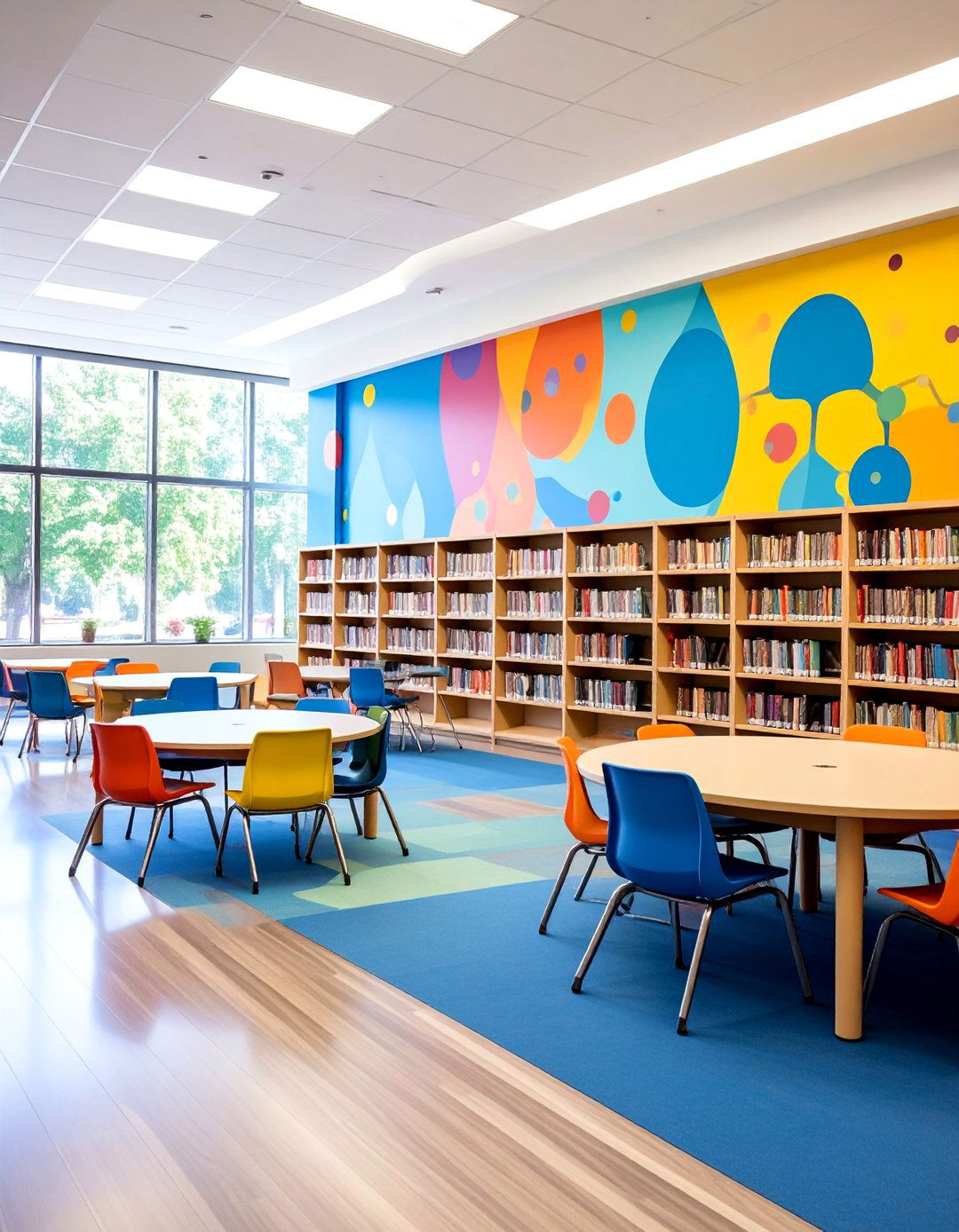

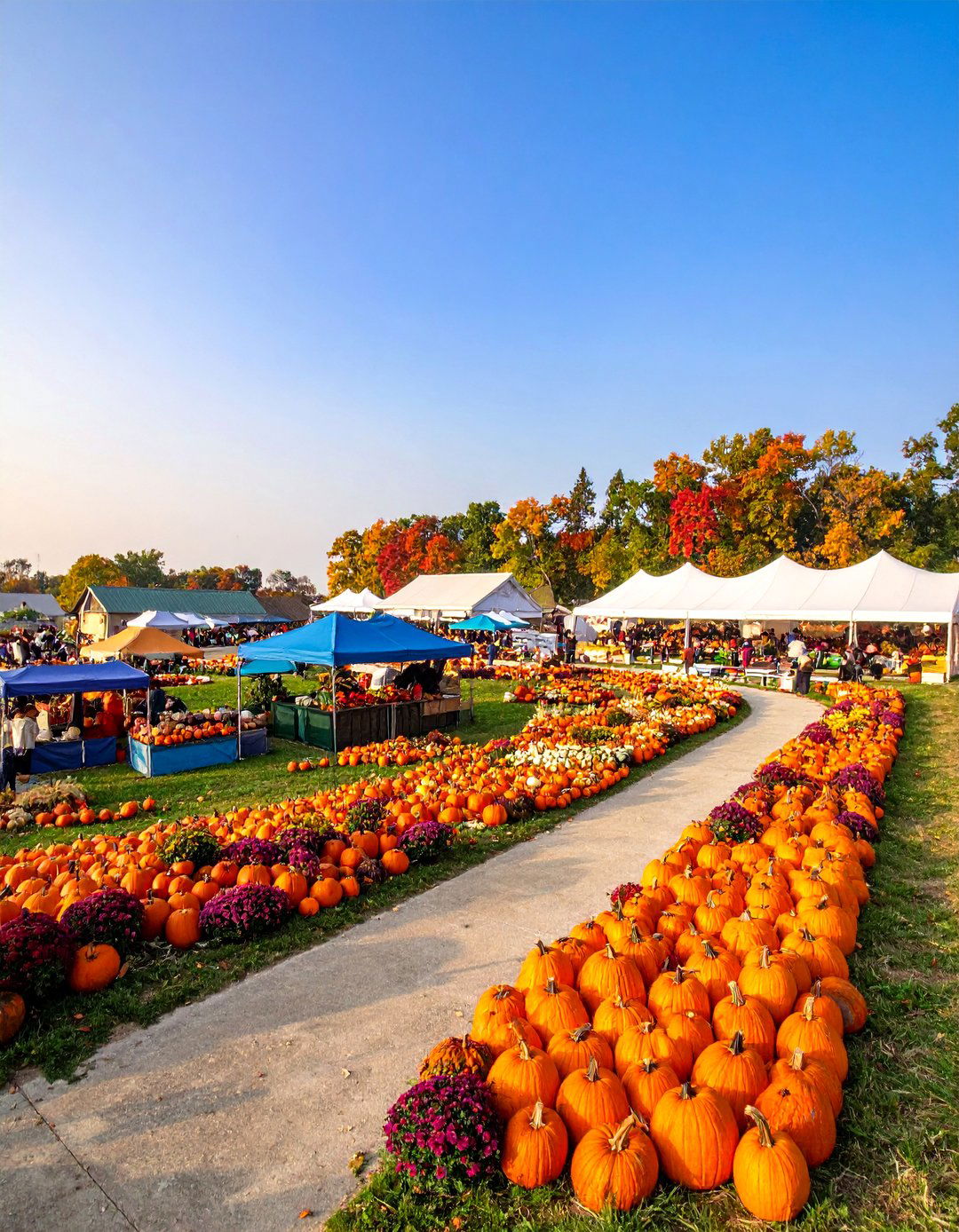

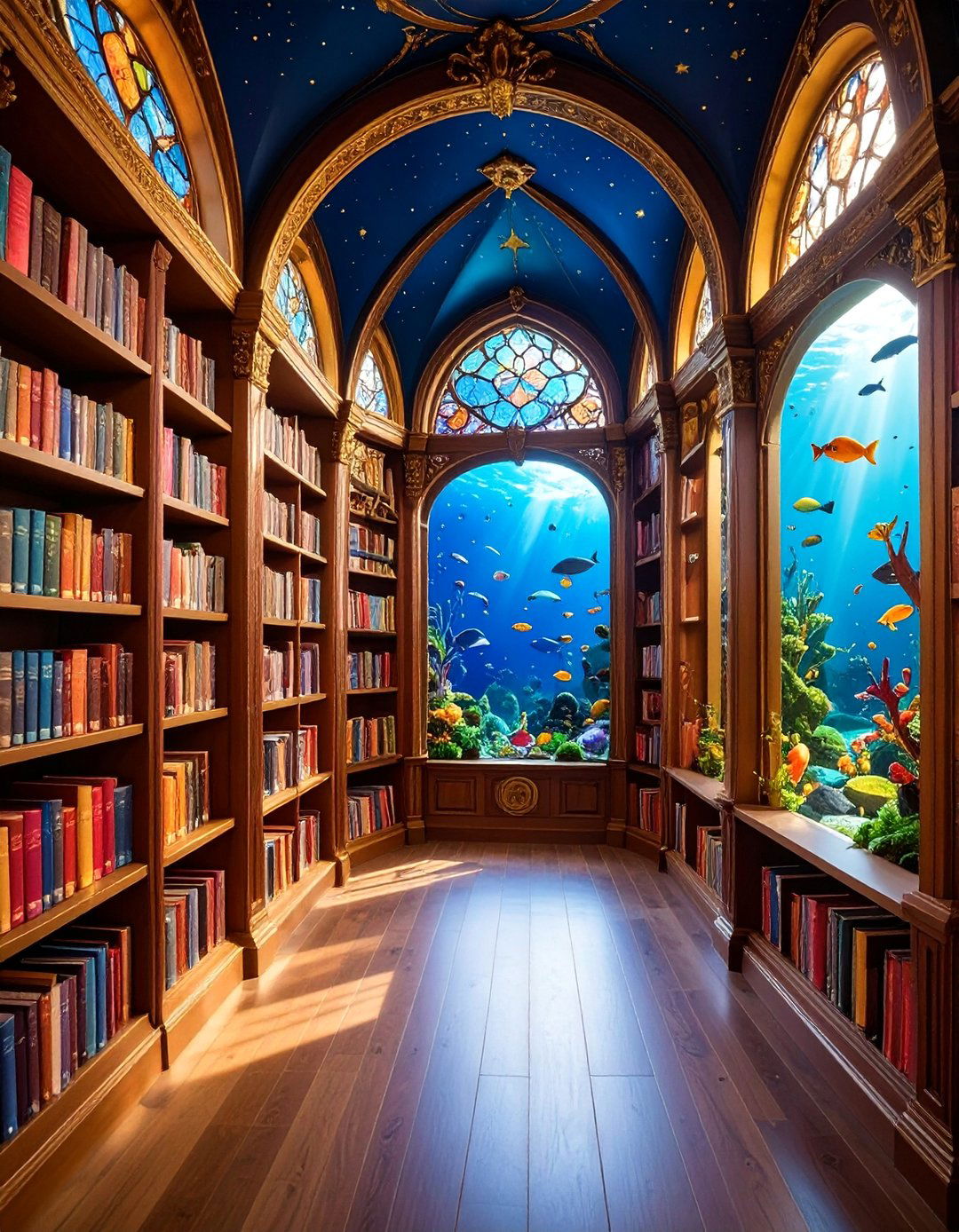
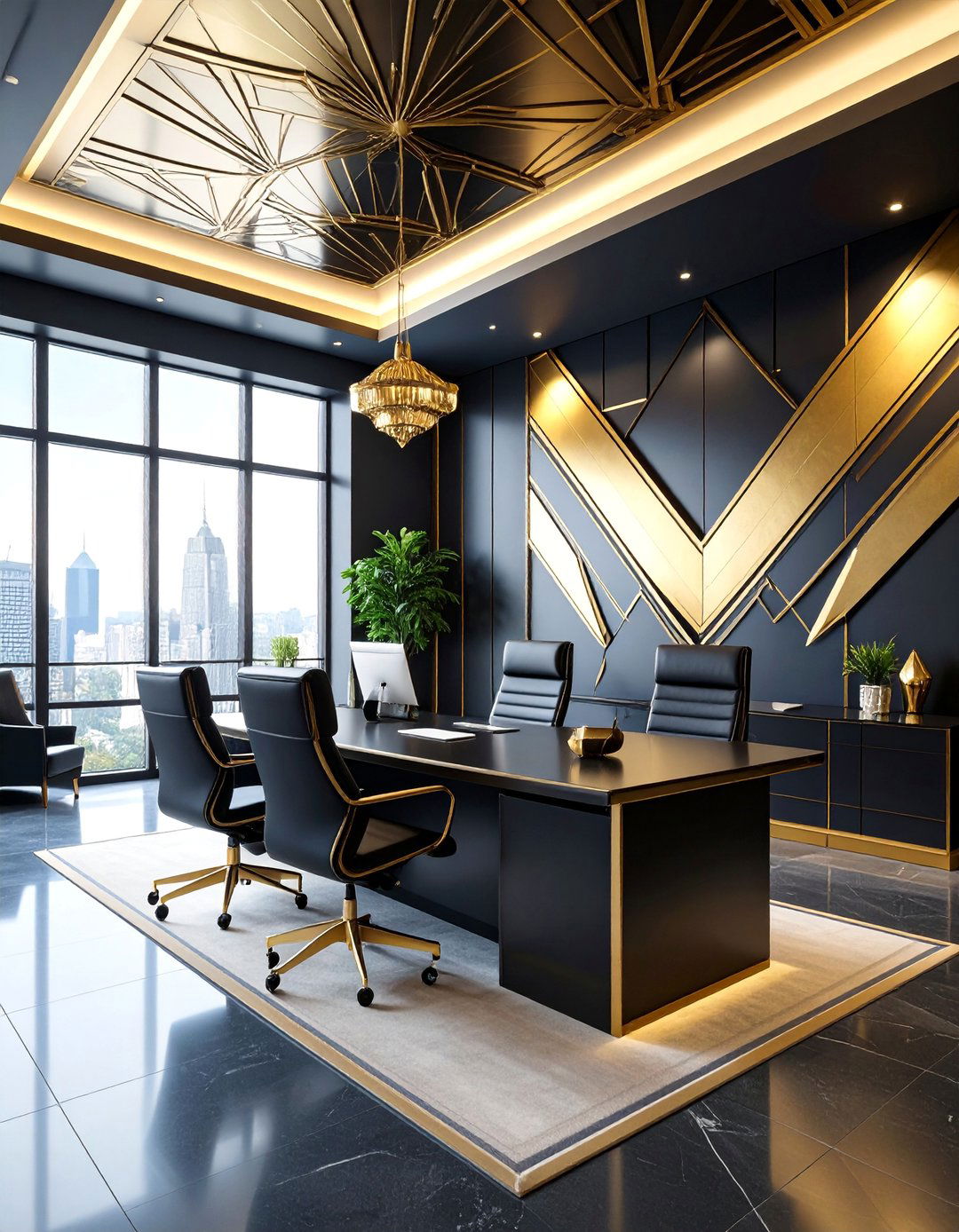
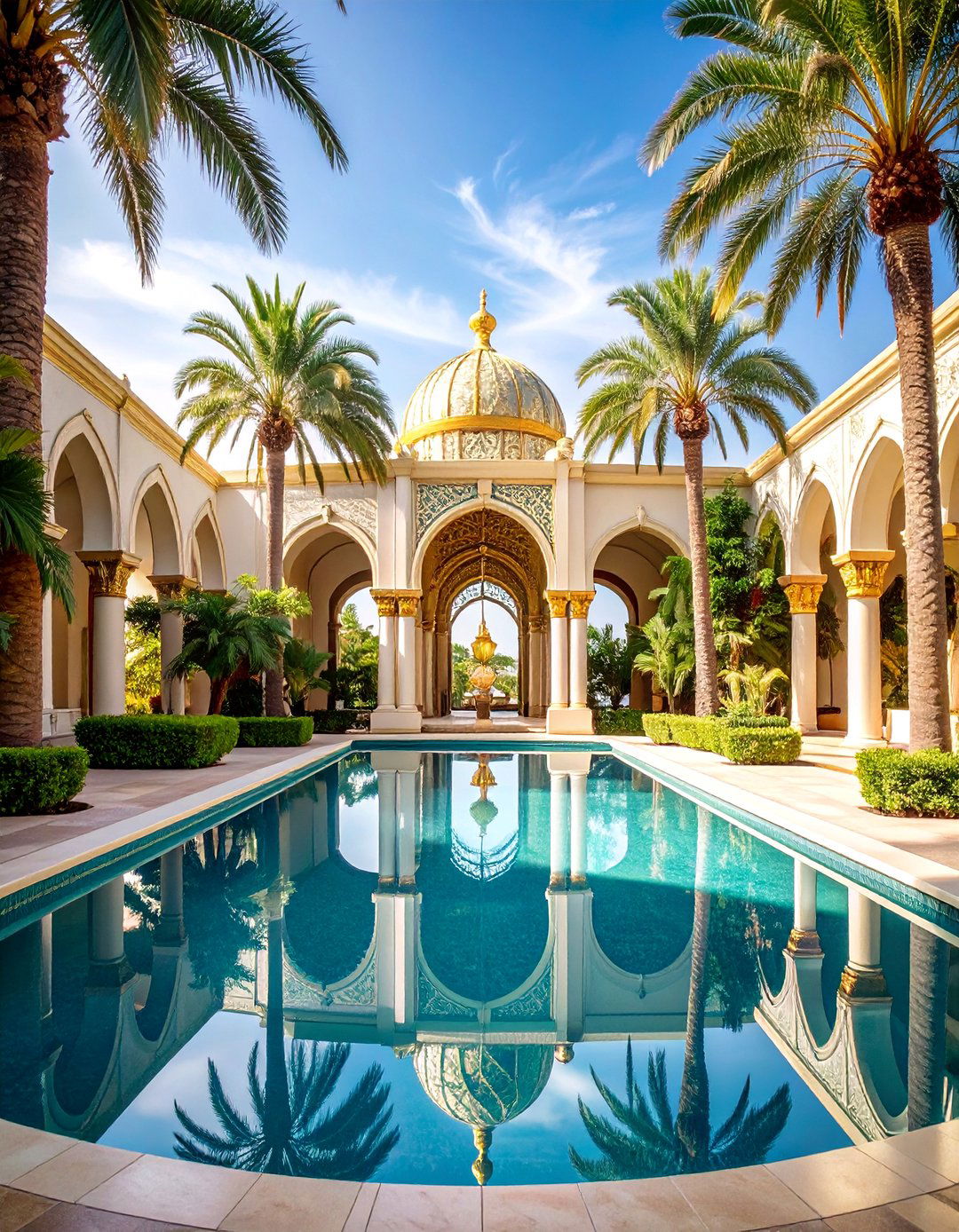
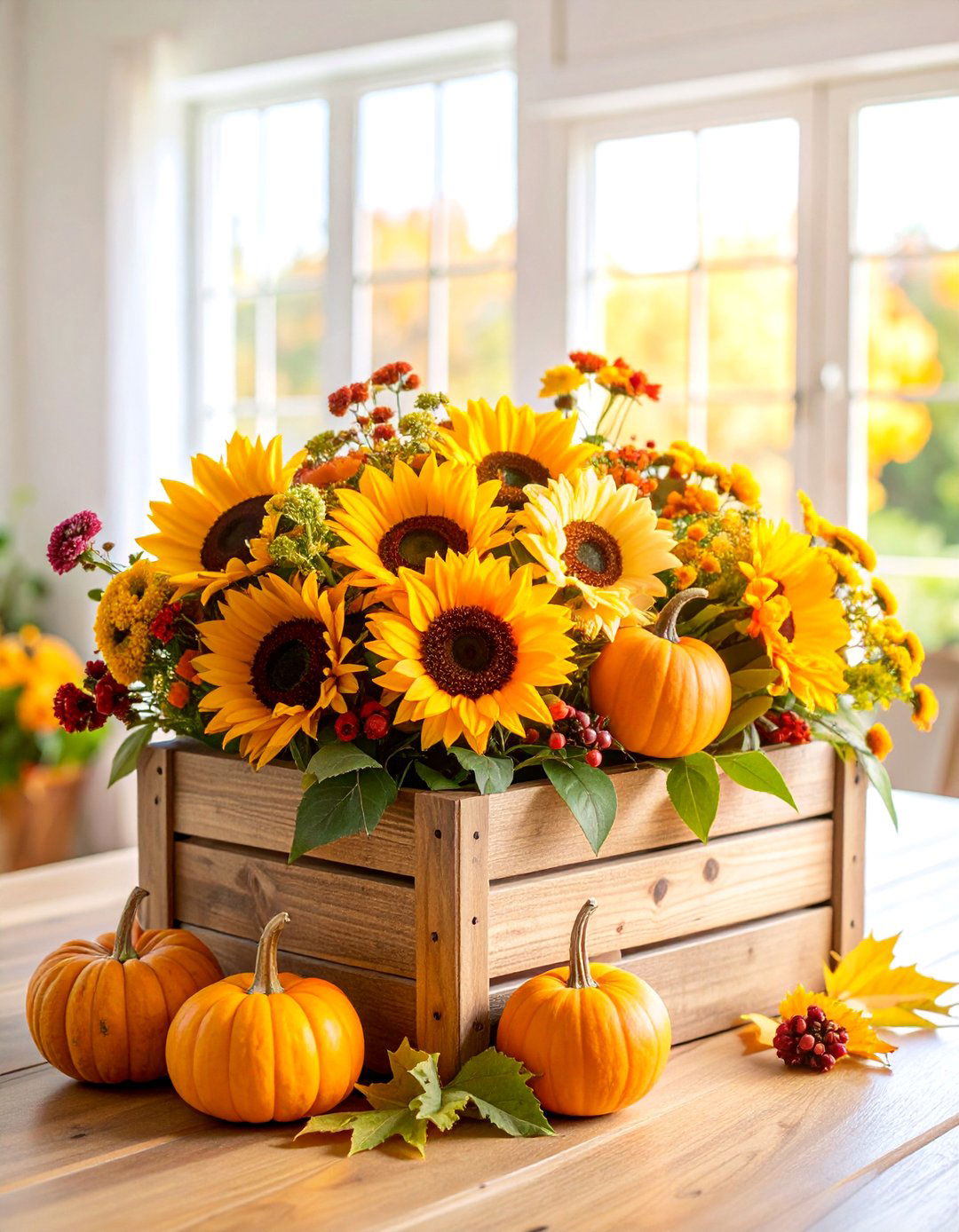
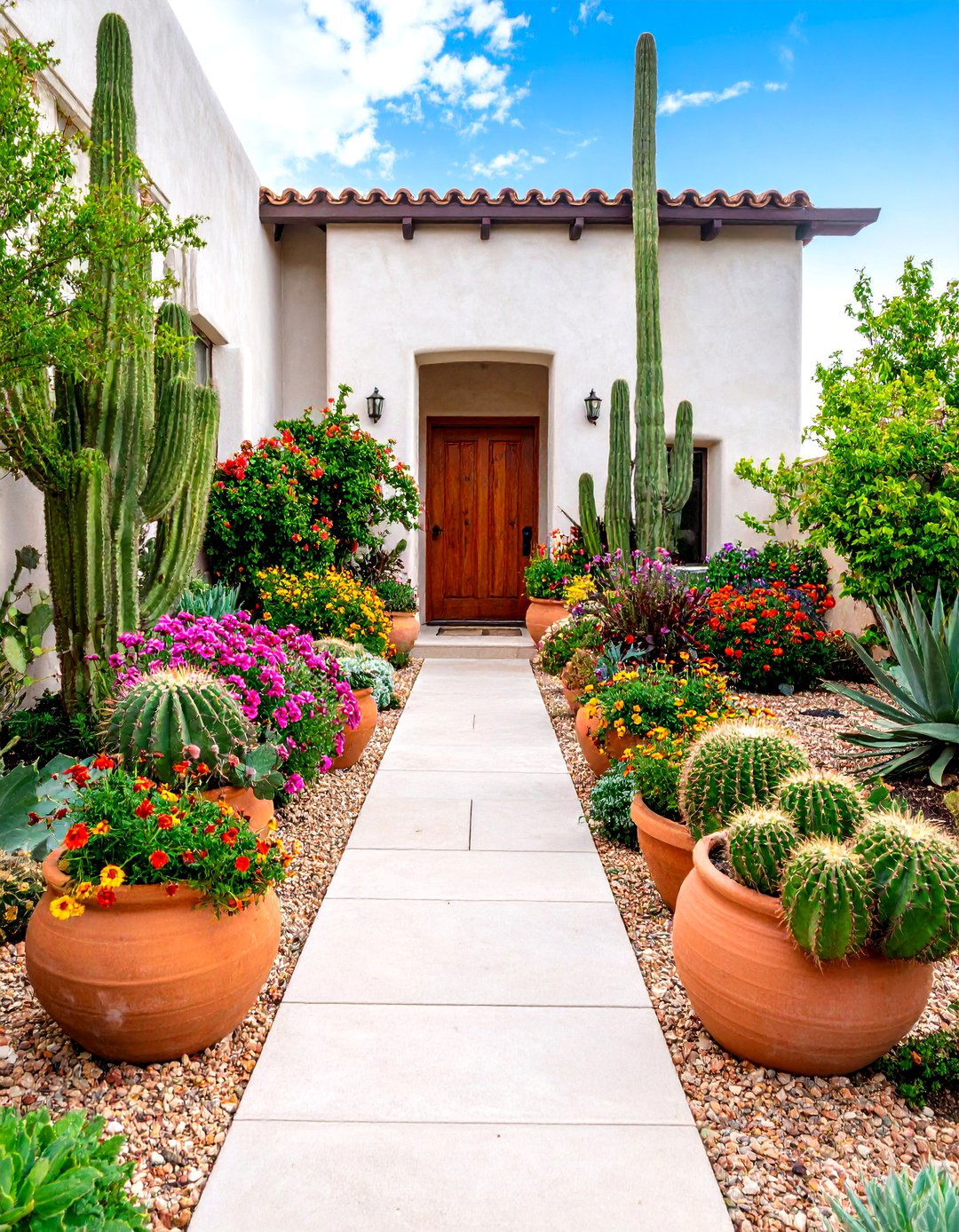
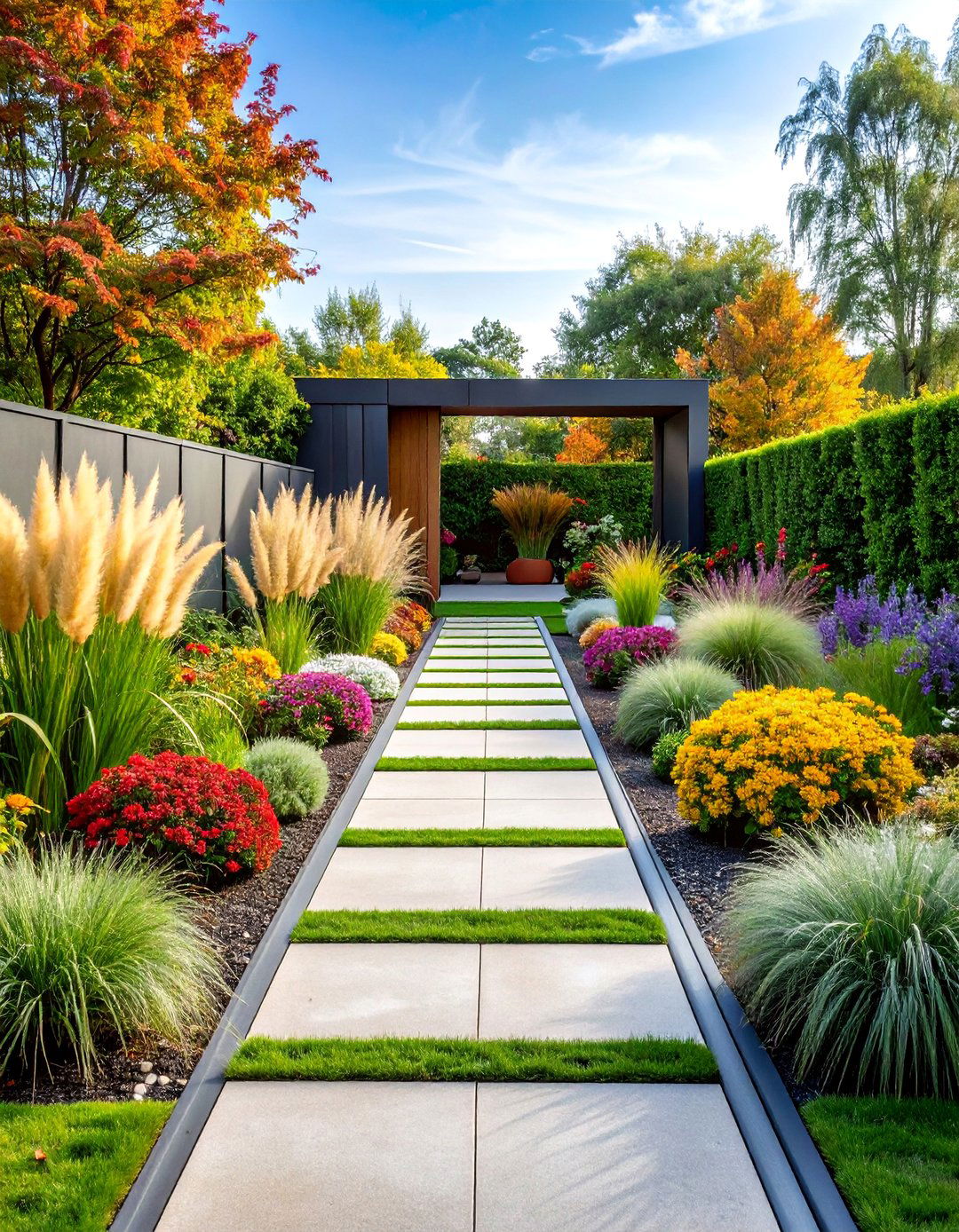

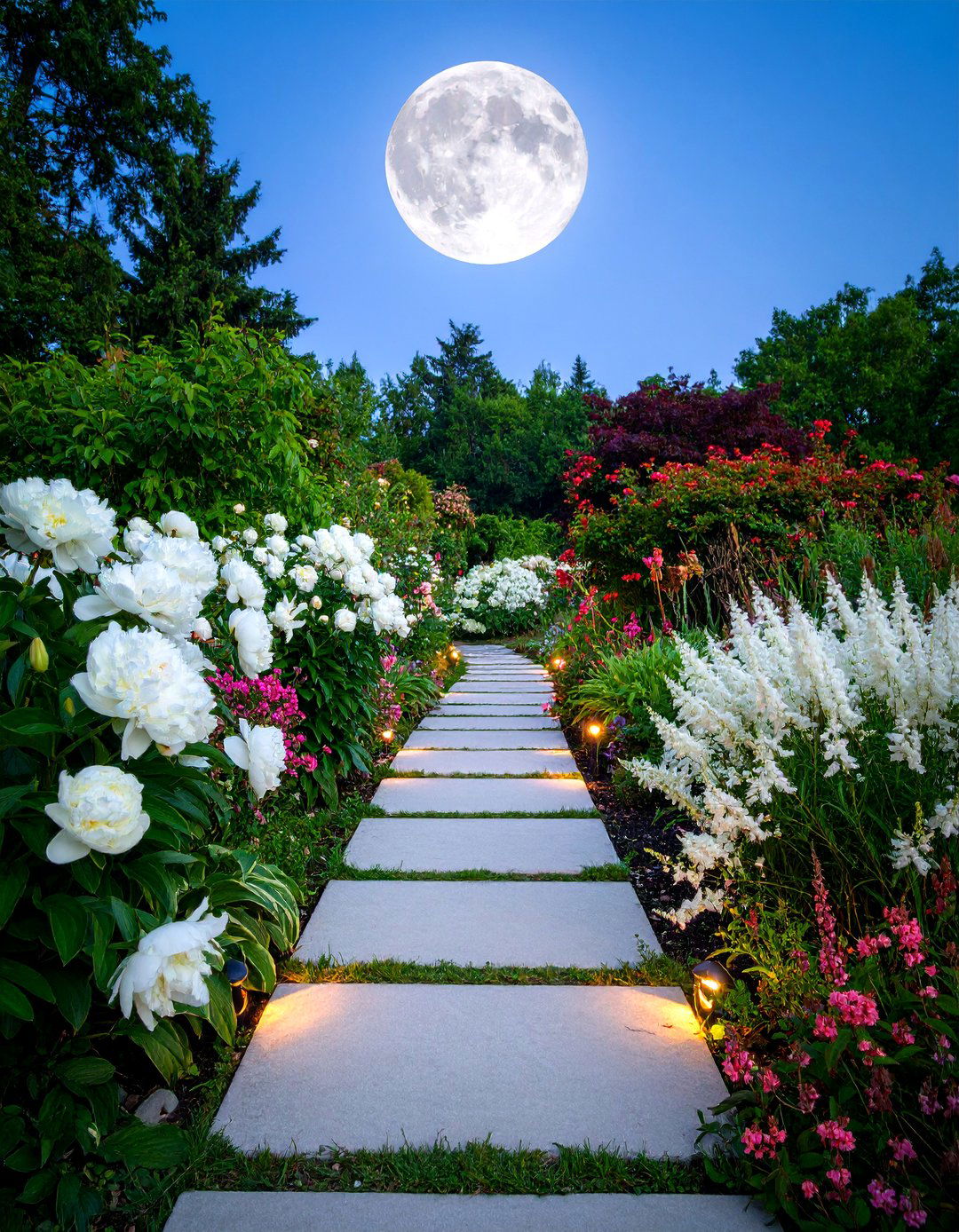
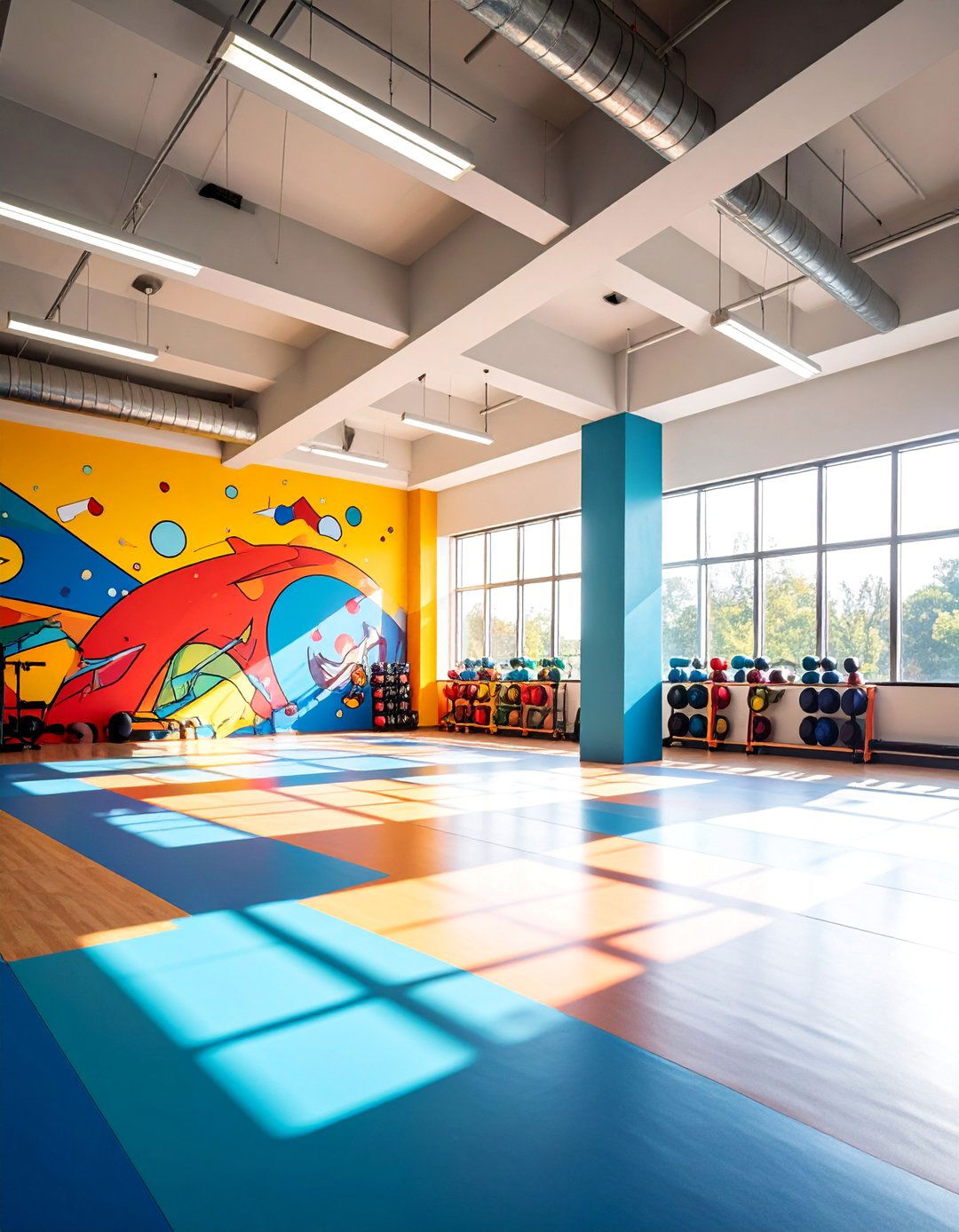
Leave a Reply